
NOTEWORTHY
LOCAL





LOCAL



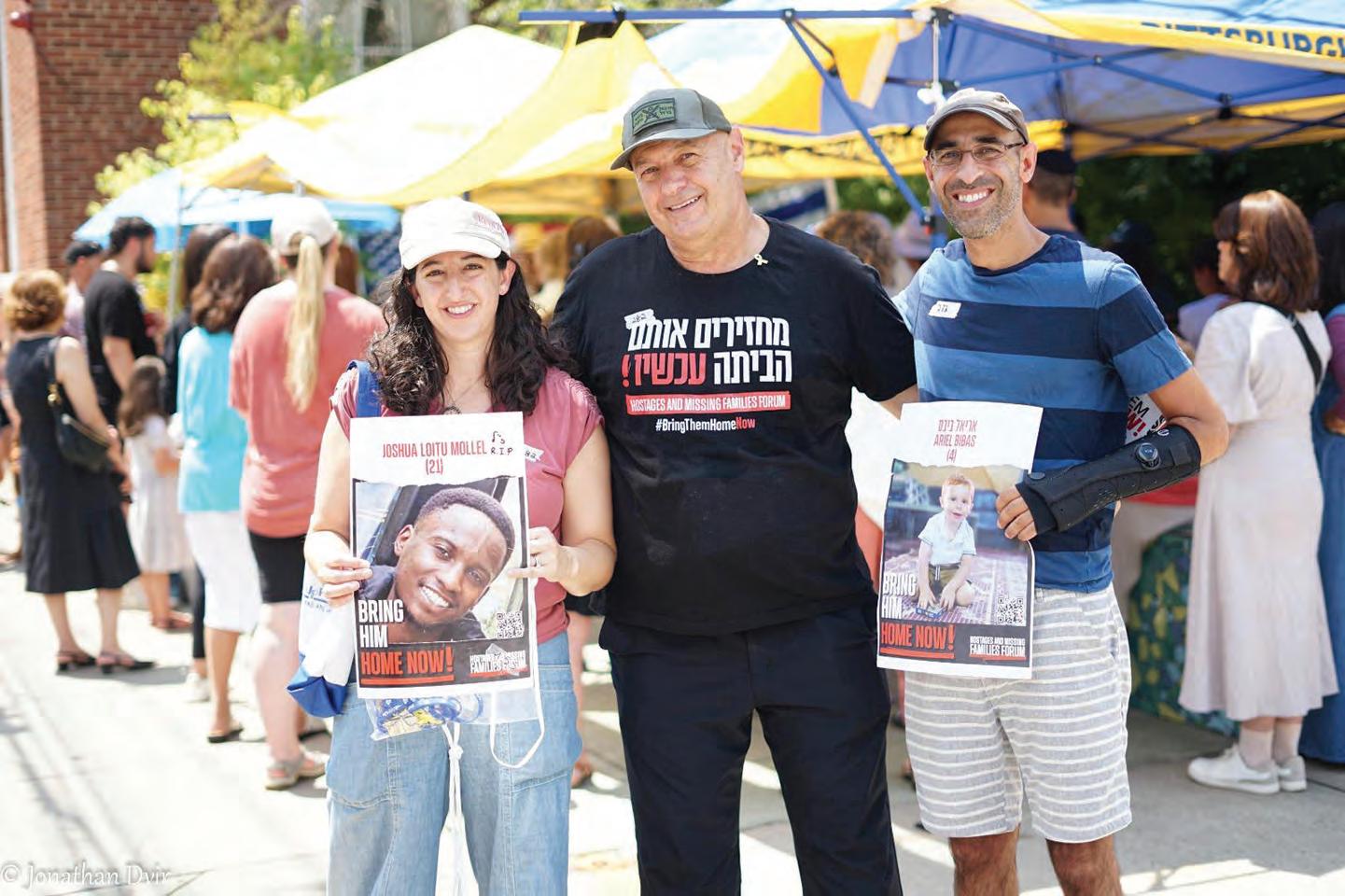
Aon the corner of Darlington Road and Murray Avenue to demand the release of an estimated 120 hostages. The captives, which include eight American citizens, have remained in Gaza for more than nine months.
Rabbi Elchonon Friedman of B’nai Emunoh Chabad said he and fellow community members will attend the vigils until every hostage comes home.
The commitment is not without benefit.
“The fact that we get together every week here in Pittsburgh is an inspiring act,”
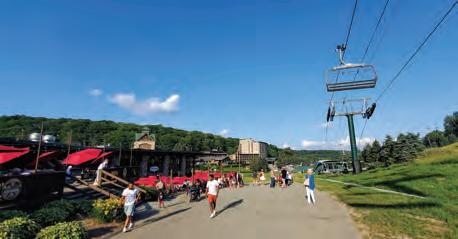
Friedman said.
“Do you see what unity we have?” vigil organizer David Dvir asked. “There are Orthodox, Conservative and Reform people here.”

By Toby Tabachnick | Editor
Dr. José-Alain Sahel refers to his patients as heroes. The same can been said of him.
cheer anybody, it doesn’t help the hostages. I can tell you the opposite. It gives a lot of strength to the families, a lot of strength to the ordinary people. The regular people in Israel, the soldiers that I met, they’re so proud that we stand behind them.”
By design, the Sunday gatherings follow a similar pattern, organizers explained.
Prayers and songs are recited. Biographies of hostages and fallen IDF soldiers are read. Signage is waved. Some participants hold placards. Other attendees stand near Darlington Road and quietly don tefillin with assistance from neighbors.
Sahel, chair and distinguished professor in the Department of Ophthalmology at the University of Pittsburgh School of Medicine, was awarded the 2024 Wolf Prize in Medicine for his work using optogenetics to restore vision to blind people.
The Wolf Prize, conferred in Israel by the Wolf Foundation, is considered one of the world’s most prestigious recognitions for scientific and artistic achievements, according to Forbes. The prize, which has been awarded since 1978, carries a monetary award of $100,000 for each of its laureates, who are selected by juries comprised of experts from around the world.


Since October, Dvir has spearheaded the gatherings. He’s underwritten printing costs, arranged for weekly speakers and worked with volunteers to ensure the vigils remain focused.
July 14 marked Dvir’s first return to the Squirrel Hill corner in two months. This summer, he, his wife and their son traveled to Israel, met with hostages’ families and told them
On Sunday, Rabbi Yisroel Altein of Chabad of Squirrel Hill helped several men lay phylacteries and recite Shema, a biblical text proclaiming God’s oneness.
Each week, tables, speakers and flags are placed in the same spaces. For the past several
“Over a third of the Wolf Prize laureates have subsequently received the Nobel Prize in corresponding disciplines,” according to the Wolf Foundation.
Nine laureates were named this year in medicine, mathematics, physics, agriculture and music.
Sahel was awarded the Wolf Prize along with his colleague Botond Roska, founding director




By David Rullo | Senior Sta Writer
On Sunday, anti-Israel protesters gathered outside the Shadyside home of University of Pittsburgh Chancellor Joan Gabel.
The group that coordinated the event, Pitt Divest from Apartheid, published Gabel’s address on its Instagram account, calling for protesters to wear masks, cover tattoos and identifying marks, park away from the protest so their license plates wouldn’t be photographed, and turn off their phones and delete metadata information from photographs taken.
That rally occurred nearly six weeks after protesters illegally trespassed and encamped on Pitt’s property at the Cathedral of Learning and violently clashed with police. It was preceded by an April event that began as an encampment on the university’s property and later moved to Schenley Plaza.
Several other protests took place at Carnegie Mellon University following Hamas terrorists’ Oct. 7 attack on Israel, killing 1,200 people and taking more than 200 hostages. The protests began almost immediately after Israel entered Gaza, beginning a long war defending the world’s only Jewish state.
A loose confederacy of progressive organizations including Pitt Divest from Apartheid, Jewish Voice for Peace Pittsburgh, Students for Justice in Palestine at the University of Pittsburgh, Against Carceral Tech and CMU Students for Palestine organized and promoted the events.
While membership and participation in these organizations’ activities are fluid, a few groups coordinate the majority of anti-Israel and anti-Zionist activity in the city. And while they all claim to not be antisemitic, some have called for the eradication
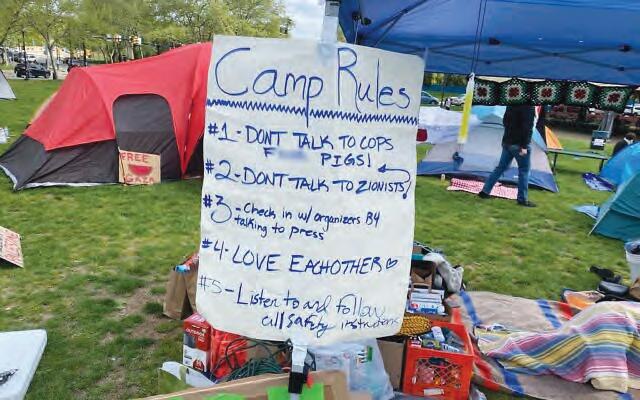
of Zionism and the elimination of the Hillel Jewish University Center of Pittsburgh, the Student Coalition for Israel and other Zionist organizations.
Some also have demanded that Pitt and CMU divest from investments in Israel and companies and organizations that have relationships with the Jewish state; boycott study abroad programs, fellowships and research collaborations with Israeli universities; remove the International Holocaust Remembrance Alliance definition of antisemitism from Pitt’s Equity, Diversity and Inclusion website; and have regularly chanted and published phrases and slogans, including “Globalize the intifada,” that are considered antisemitic by much of the mainstream Jewish community.
Locally, three groups have taken an outsized role in the creation and promotion of protesting Israel and its war against Hamas: Pitt Divest from Apartheid, Students for Justice in Palestine and Jewish Voice for Peace.
PDA has aggressively promoted the anti-Israel encampments and urged its followers to pack the courthouse when those charged with breaking the law at its events are required to appear for hearings.
The group’s Instagram account includes links to its demands of the university, petitions and a list of Israel-affiliated programs and groups at Pitt.
Despite its name and its constant calls against the University of Pittsburgh and its chancellor, PDA is not affiliated with the university, according to Pitt’s Senior Director of External Communications Jared Stonesifer.
In a social media post titled “Our Recent Demands,” PDA attempted to mitigate its calls for the elimination of Hillel and other Jewish groups, claiming it took “no issue with their role as one part of the fabric of Jewish life on campus.”
In that post, PDA also stated, however, that those Jewish groups promote “Zionist ideology” while claiming to represent the

SUBSCRIPTIONS
subscriptions@pittsburghjewishchronicle.org
412-687-1000, ext. 2
TO ADVERTISE advertising@pittsburghjewishchronicle.org 412-687-1000, ext. 1
EDITORIAL DEPARTMENT
Email: newsdesk@pittsburghjewishchronicle.org
BOARD OF TRUSTEES
Evan H. Stein, Board Chair
Gayle R. Kraut, Secretary
Evan Indianer, Immediate Past Chair
Gail Childs, Dan Droz, Malke Steinfeld Frank, Seth Glick, Tammy Hepps, Judith Kanal, Cátia Kossovsky, Charles Saul, Derek Smith
GENERAL COUNSEL
Stuart R. Kaplan, Esq.
Jim Busis, CEO and Publisher 412-228-4690 jbusis@pittsburghjewishchronicle.org
EDITORIAL
Toby Tabachnick, Editor 412-228-4577 ttabachnick@pittsburghjewishchronicle.org
Andy Gotlieb, Contributing Editor
Adam Reinherz, Senior Staff Writer 412-687-1000 areinherz@pittsburghjewishchronicle.org
David Rullo, Senior Staff Writer 412-687-1000 drullo@pittsburghjewishchronicle.org
Kathleen Gianni, Staff Writer kgianni@pittsburghjewishchronicle.org
ADVERTISING
Amy Weiss, Account Executive (412) 613-0697 aweiss@pittsburghjewishchronicle.org
PRODUCTION
Jeni Mann Tough
Production Manager
Carl Weigel
Art/Production Coordinator
Subscriptions subscriptions@pittsburghjewishchronicle.org 412-687-1000, ext. 2
Published every Friday by the Pittsburgh Jewish Publication and Education Foundation 5915 Beacon St., 5th Floor Pittsburgh, PA 15217
Phone: 412-687-1000
POSTMASTER:
Send address change to PITTSBURGH JEWISH CHRONICLE, 5915 BEACON ST., 5TH FLOOR PITTSBURGH, PA 15217
(PERIODICAL RATE POSTAGE PAID AT PITTSBURGH, PA AND AT ADDITIONAL MAILING OFFICES) USPS 582-740

“totality of Jewish students at Pitt.” It also took issue with a Jan. 24 event sponsored by Hillel where an IDF soldier spoke.
Laura Cherner, the director of the Jewish Federation of Greater Pittsburgh’s Community Relations Council, said those statements are antisemitic because they go beyond criticism of the Israeli government or its actions.
“We’re seeing groups and individuals who are denying what happened on Oct. 7, regularly engaging in Holocaust inversion, calling for the termination of Jewish university groups on campus, claiming that any Zionist or Zionist entity is a legitimate target for protests or threats,” Cherner said.
Unlike, PDA, Students for Justice in Palestine at Pitt is a student group affiliated with the university.
On Instagram, SJP has reposted unsubstantiated claims, including that “Israel beheaded a child and burned displaced Palestinians alive in their tent.”
The group also has echoed accusations at rallies and online that Israel is committing “genocide” and has called for both Pitt and CMU to divest from the Jewish state while leading anti-Israel chants at various protests and rallies.
In an Oct. 9 article, the Anti-Defamation League’s Center of Extremism said the national SJP organization has “explicitly endorsed the actions of Hamas and their armed attacks on Israeli citizens and voiced an increasingly radical call for confronting and ‘dismantling Zionism on U.S. college campuses.’”
The article quoted an SJP statement that called Hamas’ massacre of Israelis “a historic win for Palestinian resistance” and called for “Not just slogans and rallies but armed confrontation with the oppressors.”
Manuscripts, letters, documents and photographs sent to the Pittsburgh Jewish Chronicle become the property of this publication, which is not responsible for the return or loss of such items.
The Pittsburgh Jewish Chronicle does not endorse the goods or services advertised or covered in its pages and makes no representation to the kashrut of food products and services in said advertising or articles. The publisher is not liable for damages if, for any reason whatsoever, he fails to publish an advertisement or for any error in an advertisement. Acceptance of advertisers and of ad copy is subject to the publisher’s approval. The Pittsburgh Jewish Chronicle is not responsible if ads violate applicable laws and the advertiser will indemnify, hold harmless and defend the Pittsburgh Jewish Chronicle from all claims made by governmental agencies and consumers for any reason based on ads appearing in the Pittsburgh Jewish Chronicle

original bills.
“Each one is a blessing,” he said. “Each one tells a story.”
By David Rullo | Senior Staff Writer
July 9 — the third of Tammuz — marked the 30th yahrzeit of Rabbi Menachem Mendel Schneerson.
After more than four decades as the leader of the Chabad-Lubavitch movement, Schneerson, or “the Rebbe,” as he is better known, left behind a legacy of writings, including letters, videos, hundreds of volumes of scholarship, Torah commentaries and 5,000 shluchim, or emissaries, leading more than 3,000 institutions serving Jewish communities in 100-plus countries on six continents.
And while there is no denying the international influence of the Rebbe — during his lifetime Schneerson met with dignitaries including New York Mayors Ed Koch and Rudy Giuliani, Presidents Jimmy Carter and Ronald Reagan, Israel Prime Ministers Menachem Begin and Yitzhak Rabin and many more — it was through personal connections with adults and children alike that he empowered generations of Chabad leaders who have carried his vision into the 21st century.
Chabad Jewish Center of Monroeville Rabbi Mendy Schapiro grew up in Crown Heights, Brooklyn, the world headquarters of the Chabad-Lubavitch movement. He was 10 when Schneerson died but met him several times. While he doesn’t have clear memories of the more intellectual activities — davening and farbrengens (gatherings) — that the Rebbe led, his recollections are visceral.
“It was an honor to just look at the Rebbe and see the love and the passion for Yiddishkeit in his eyes,” Schapiro said. “It was the love for everybody that interacted with him.”
On Shabbat afternoons, after davening, Schaprio’s family would attend farbrengens to hear the rabbi talk on a variety of subjects.
“For me, it was the surrounding experience,” he said, “the vision, the sights, the atmosphere, the love, the unity, the power, the Jewish pride. You could literally feel the energy in the room.”
After Shneerson presented a deep talk on concepts in Judaism, he would shift to joyous, exciting songs, Schapiro recalled.
“You would get swallowed up in that feeling and energy,” he said. “I feel so lucky to have been a part of something like that.”
Like so many others who came before and after him, Schapiro received dollar bills from the Rebbe. Schneerson believed that when two Jews met it should benefit a third, and he spent hours on Sundays and special occasions handing out dollars earmarked for charity. Most who received the dollar bills would keep them as mementos and substitute other bills for charity.
Schapiro said that his family didn’t stand in line every Sunday, realizing how many people wanted to meet the Rebbe. Instead, they would visit on birthdays or special occasions.
“As soon as we got the dollar from the Rebbe’s hand, we would go out the back exit and my dad would take the dollar — he had a pen and would write down the date we received the dollar bill and he would swap it for another dollar,” he said. Schapiro said after he became an adult and was married, his father gave him the
Dollars weren’t the only currency handed out by Schneerson, though. He often distributed coins to children. Schapiro turned one of those coins into a necklace he and his wife gave their daughter when she became a bat mitzvah.
“That’s her prized possession,” he said.
Like Schapiro, Chabad of Squirrel Hill Rabbi Yisroel Altein grew up in Crown Heights on the same block as Chabad’s headquarters.
“I spent every Saturday davening. I spent years there,” he recalled. “Even as a little kid, I was probably, like, 8 years old, and would sit on my father’s lap when the Rebbe would speak for the farbrengen on Shabbos afternoon for hours.”
Altein’s father was one of the rabbis tasked with memorizing the Rebbe’s talks and recording them. He said the time they spent together listening to Schneerson was the greatest gift his father gave him.
“Somehow, he was able to sit there and concentrate with a little kid on his lap,” Altein said.
Altein credits those times with inspiring him to become a rabbi and to work for the Jewish community.
He noted one moment in particular that taught him the importance of both learning and keeping the mitzvahs.
When he was 12, Altein took part in Chidon Sefer Hamitzvot, an international Torah competition, winning the New York leg of the contest and earning a trip to Israel. Before he left, the future rabbi was given a private audience with the Rebbe.
“The Rebbe gave me a broad smile, a second dollar to give to charity in Israel and told me, ‘It’s not enough to study the mitzvos — one has to fulfill them, too.’ He said it with a big smile, so as a 12-year-old, there was a reminder that it’s not enough to just study, you have to put it into action, too,” Altein said.
Chabad of the South Hills co-Director Batya Rosenblum is another Crown Heights transplant who davened each Shabbos with the Rebbe at 770 Eastern Parkway. She especially was drawn to his blowing the shofar on Rosh Hashanah.
“It’s very hard to describe the tremendous awe that filled the entire 770 shul,” she said. “We’re talking about people from all over the world — planeloads from Israel, France and England, many different places, who all came to participate in the High Holiday season.”
It was, she said, like a recharging of a person’s spiritual battery for the year.
Before Schneerson blew the shofar, Rosenblum recalled, he placed bags filled with thousands of letters asking for blessings on the bimah.
“When he did blow the shofar, it wasn’t a loud blast,” she said. “It was almost weak, but it was so powerful. You had to strain your ears to hear it. There were thousands of people, all so silent. There was a feeling of, literally, a channel with the questions and troubles and issues of people around the world directed to heaven through the blowing of the shofar.”
In addition to dollars, she received a letter from the Rebbe for her bat mitzvah. It hangs framed in her home next to a similar letter received by

her husband, Rabbi Mendy Rosenblum.
“It very much showed the Rebbe’s interest in everyone,” she said. “He was in tune with all the good deeds and important things of a little girl or little boy or teenage girl and what they were up to.”
Despite living in Pittsburgh, Rochel Tombosky met Schneerson several times.
“Even at 14 or 15, the Rebbe looked me straight in the eyes,” she recalled, “giving me his undivided attention and a heartfelt blessing for success. If someone of such profound significance could see my worth and invest his time in me, I believed in myself as a result.”
Please see Schneerson, page 16


By Abigail Hakas | Special to the Chronicle
When 17-year-old basketball guard


Trey Schachter takes the court at the end of the month, it won’t be at his usual stomping grounds at Taylor Allderdice High School: He’ll be competing alongside other Jewish athletes in London at the European Maccabi Youth Games.
The competition is one of many held by Maccabi USA, a nonprofit that aims to build Jewish pride and connection to Israel through sports. The weeklong European Maccabi Youth Games has a round-robin tournament for basketball, one of many sports in the competition, and will break for Shabbat. The games begin on July 30 and conclude on Aug. 5.
Trey Schachter’s father, Joshua, played in the 2003 Pan American Maccabi Games and the 2005 Maccabiah Games in Israel and helped organize past teams.
“You connect with other Jewish athletes, not only in this country, but around the world,” Joshua Schachter said. “It brings Jews together, brings them to Israel, which is very important and more now than ever its mission is needed in the world.”
His father’s involvement inspired Trey Schachter to try out for Maccabi. Trey Schachter and his brother Zane both competed in the 2023 JCC Maccabi Games in Fort Lauderdale, Florida, for Team Pittsburgh, earning a silver medal. Zane Schachter will compete in the 2024 JCC
like, a tradition.”
a basketball player you can be today. It’s how hard you’re willing to work to get there,” Joshua Schachter said of his sons’ successes. “I’m proud that they are working hard at this point, and they have goals, and they’re trying to achieve their goals. I think
“You connect with other Jewish athletes, not only in this country, but around the world. It brings Jews together, brings them to Israel, which is very important and more now than ever its mission is needed in the world.”
– JOSHUA SCHACHTER
Trey Schachter was quick to answer the question of whether it was daunting to follow in his father’s footsteps.
“No,” he said. “I want to be better than him.”
That competitive streak is evident in Trey Schachter’s success at the sport. He has played travel basketball with All Ohio Red, a team with the Amateur Athletic Union, since last year. He’s earned several Division I offers from colleges and plans to accept one after he graduates next year.
While he dreams of competing in the NBA, he isn’t sure yet if he wants to move away from his family to compete overseas.
“It’s not necessarily about how good of
that’s a life lesson that I’m pretty excited about for both.”
And Trey Schachter is no stranger to putting in the effort. He begins his days with a two-hour workout, lifting weights afterward, and ends the day with a shootaround.
That routine has instilled him with a sense of confidence going into the games. He said he isn’t immune to nerves, but it’s usually from excitement. Before each game, he visualizes the ball going into the hoop.
But the Maccabi Games will be different for Trey Schachter. He said he rarely meets other Jewish athletes at his games.
“My AAU team, there’s no one else Jewish on my team, so when I go to Maccabi, I think
it’d be really fun playing with kids that I have something in common with besides just basketball,” he said.
Trey Schachter won’t be the only Pittsburgher competing in the European Youth Games this year.
Benji Smuckler, 15, and Jonny Balk, 16, will be on the U16 futsal team. They both play soccer at Winchester Thurston School in Shadyside.
Balk and Smuckler both previously played in the JCC Maccabi Games in Florida and are excited to play in London.
“I want to, like, meet new people and, obviously, see the Jewish community in other countries,” Smuckler said. “Obviously, a win would be really good, right, but I kind of just want to feel the Jewish community. Sometimes, it’s hard to feel that because we’re a bit disconnected.”
Balk is on the mend from a broken tibia, but that hasn’t stopped him from training alongside Smuckler to prepare for the competition.
“I’ve watched some of the recordings of a bunch of the games, and you can see there’s a pretty big atmosphere there,” Balk said. “I’m definitely a little nervous because I’ve never played futsal at this high of a level. I’m mostly just a soccer player, but I’m definitely excited for the challenge.”
Trey Schachter captured the overarching goal of all the athletes with a simple sentiment: “I want to win. I want to make some new friends that are also Jewish.” PJC
Abigail Hakas is a freelance writer living in Pittsburgh.
invite discussion of ‘Hereafter’ by focusing on grief, life
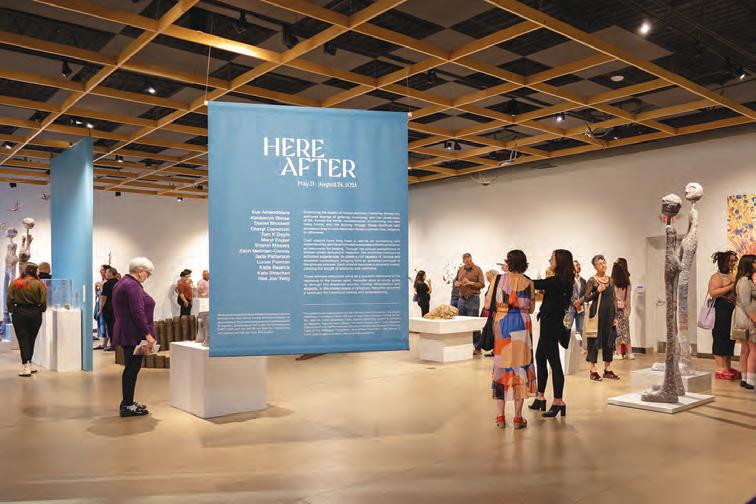
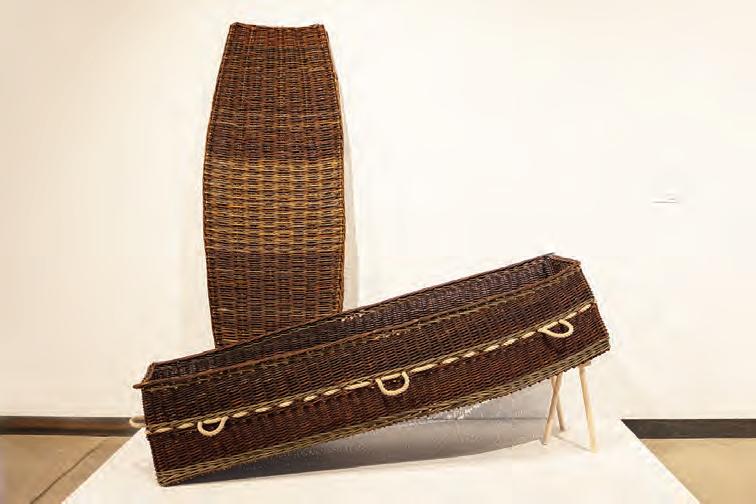
By Adam Reinherz | Senior Staff Writer
This story contains a reference to suicide. If you or someone you know needs help, the national suicide and crisis lifeline is available by calling or texting 988. There is also an online chat at 988lifeline.org.
ALawrenceville exhibition is showcasing the work of 13 artists grappling with grief, mourning and the celebration of life.
“Hereafter,” which runs through Aug. 24 at Contemporary Craft, “is a platform for dialogue and understanding,” Contemporary Craft Associate Director Yu-San Cheng said.
Through sculptures, jewelry and prints, the exhibition taps various media to reach people of different ages, backgrounds and communities, Cheng added.
“There are access points for everyone,” Contemporary Craft Director of Marketing Mandy Wilson said.
None of the works contain distinctly Jewish iconography, however, several pieces feel resonant, Nancy Zionts told the Chronicle.
Zionts, the Jewish Healthcare Foundation’s chief operating officer and chief program officer, toured the exhibition after its opening.
“I am not a person who spends a lot of time in museums — it’s not my way of connecting — and yet I walked in there and there were a few of the pieces that I just looked at and said,
One piece, “Willow Casket,” uses willow, hemp and cotton rope to create an 84-inchby-27-inch-by-17-inch chest for the dead.
The work, by Leechburg artist Daniel Brockett, evokes thoughts of green burials, Cheng said.
Though not pine, there’s a similarity between the piece and traditional Jewish coffins, as both types of caskets enable the deceased and its surroundings to disintegrate over time.
Elsewhere in the exhibit, miniature recreations of blanket forts depict Washington, D.C. artist Tom Kieran Doyle’s efforts to “create a world” where he could shelter and preserve the memory of his brother John, who died by suicide in 2015.
Like several artists in the exhibition, Doyle recorded an audio guide for his work.
“In creating these sculptures, every miniature piece of furniture, every pillow and scrap of fabric, was placed there to protect, to care for and to open up a moment of nostalgia,” he said. “Each component that I added to the work was there to build up and prepare a magical place for the memories of John to lie softly.”
“Hereafter” is supported by several sponsors, including the Jewish Healthcare Foundation and Ralph Schugar Chapel, Inc..
“This exhibition touches every aspect of our lives,” Sharon Ryave Brody, Ralph Schugar Chapel’s president, said.
Brody, a licensed funeral director with nearly 30 years of experience, is joining Zionts at Contemporary Craft on July 18 to discuss, “Grief and Loss From a Jewish Perspective.”
lot of attention to disease and illness and death,” Zionts said. “Grief is one of those areas that is tremendously overlooked.”
Judaism’s approach to death is fascinating, she said.
“When you go to a shiva house, it’s not about only sadness,” Zionts said. “It’s about the opportunity to talk about the person who was lost. That piece of memory, and that respect for a life well lived, is a really important part of the grieving process.”
Through its customary observances, Judaism eases mourners along, Zionts said. “From shiva, through yahrzeit, through yizkor we have a timetable built in to address grief.”


The exhibition doesn’t specifically address those rites, but the ideas are present.
“There’s definitely a component of sadness, and there’s a component of loss, but there’s also a component of memory, and legacy and celebration,” Zionts said.
These pieces demonstrate the intricate ways artists have fortified remembrances of loved ones.
“Hereafter” addresses grief but “it’s not all about sadness,” she said. “It’s about using grief in all of its forms to keep memories alive, to keep stories alive.” PJC
Adam Reinherz can be reached at areinherz@pittsburghjewishchronicle.org.



The talk is “just one more way that I can encourage our whole community to not be
“We live in a medicalized society and pay a
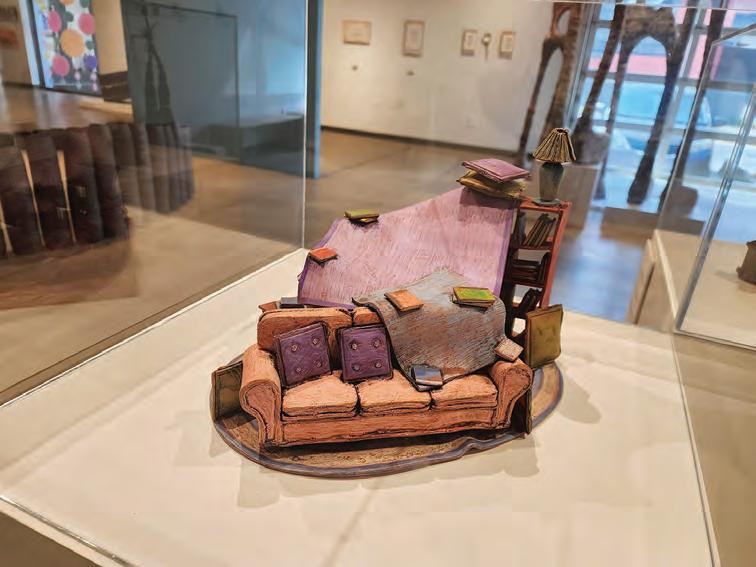


“Do not forget the past but do not be held captive by it.”






Submit calendar items on the Chronicle’s website, pittsburghjewishchronicle.org. Submissions also will be included in print. Events will run in the print edition beginning one month prior to the date as space allows. The deadline for submissions is Friday, noon.
FRIDAYS, JULY 19; AUG. 23
Join Tree of Life Congregation as they celebrate the welcoming of Shabbat. Meet before Shabbat begins to greet one another in the beautiful Rodef Shalom Botanical Gardens for Shabbat on the Rocks. Free. 6 p.m. 4905 Fifth Ave.
SUNDAY, JULY 21
Join Chabad of the South Hills for their Summer BBQ Party. Enjoy life-size lawn games, bubbles and toddler fun, grand minute-to-win-it game, crafts, food, drink and more. 4:30 p.m. 1700 Bower Hill Road. chabadsh.com/summerbbq.
SUNDAYS, JULY 21–DEC. 29
Join a lay-led online parshah study group to discuss the week’s Torah portion. No Hebrew knowledge needed. The goal is to build community while deepening understanding of the text. 8:30 p.m. For more information, visit bethshalompgh.org.
MONDAYS, JULY 21, 29
Join Chabad of the South Hills at their new location for the Gate of Trust, a women’s summer learning series. 11 a.m. $18 suggested donation. 1700 Bower Hill Road. chabadsh.com.
MONDAYS, JULY 22–DEC. 30
Join Congregation Beth Shalom for a weekly Talmud study. 9:15 a.m. For more information, visit bethshalompgh.org.
Join Temple Sinai for an evening of mahjong every Monday (except holidays). Whether you’re just starting out or have years of experience, you’re sure to enjoy the
camaraderie and good times as you make new friends or cherish moments with longtime pals. All are welcome. Winners will be awarded Giant Eagle gift cards. All players should have their own 2024 mahjong cards. Contact Susan Cohen at susan_k_cohen@yahoo.com if you have questions. $5. templesinaipgh.org.
TUESDAY, JULY 23
Young children and their grownups are invited to join Rodef Shalom Librarian Sam Siskind for a story in their Biblical Botanical Garden followed by a crafty activity. 1 p.m. rodefshalom.org.
WEDNESDAY, JULY 24
Join Chabad of the South Hills for their Senior Carnival Enjoy a picnic-style lunch, interactive games and summer fun. Suggested donation $5. Noon. RSVP by July 19 to 412-278-2658. chabadsh.com.
Rendezvous in Rodef Shalom’s Biblical Botanical Garden for a live performance with Craig Davis Jazz. Join them for drinks and hors d’oeuvres as they bring the swinging sounds of the Jazz Age back to life. Free. 6:30 p.m. rodefshalom.org.
WEDNESDAYS, JULY 24; AUG. 7, 28
Join JFCS and 10.27 Healing Partnership for an art-based mindfulness program. The group will explore ways making art can help regulate the nervous system, promote playfulness and imagination, and connect us more deeply to our bodies, emotions, thoughts and worldviews. Attendees will come together in community as we explore di erent art mediums, share our personal experiences and reflect on how art can influence us all. Free. 10 a.m. 10.27 Healing Partnership Suite, 3rd floor of the JCC in Squirrel Hill. Membership not required. Registration required. 1027healingpartnership.org/art-in-community-3.
WEDNESDAYS, JULY 24–SEPT. 4
Join Rodef Shalom Congregation for Biblical Garden Open Door Tours: docent-led tours of the

congregation’s Biblical Botanical Garden the first Wednesday of the month. Free. Noon. 4905 Fifth Ave. rodefshalom.org/garden.
WEDNESDAYS, JULY 24–DEC. 18
Temple Sinai’s Rabbi Daniel Fellman presents a weekly Parshat/Torah portion class on site and online. Call 412-421-9715 for more information and the Zoom link.
Bring the parashah alive and make it personally relevant and meaningful with Rabbi Mark Goodman in this weekly Parashah Discussion: Life & Text. 12:15 p.m. For more information, visit bethshalompgh.org/life-text.
WEDNESDAYS, JULY 24; AUG. 7, 28; SEPT. 4, 18
Chabad of Monroeville invites you to spend an hour playing mahjong and other games. Play, shmooze, learn a word of the Torah, say a prayer for Israel and, of course, nosh on some yummy treats. Free. 7 p.m. RSVP is required: SusanEBurgess@gmail.com, or text or call 412-295-1838. 2715 Mosside Blvd. jewishmonroeville. com/mahjong.
SATURDAY, JULY 27
Join Rabbi Hazzan Je rey Myers as he dialogues with Pastor Vincent Campbell. Pastor Campbell is senior pastor of Ebenezer Baptist Church and a longtime friend of Tree of Life Congregation. 9:45 a.m. Levy Hall, Rodef Shalom Congregation. treeoflifepgh.org.
TUESDAY, JULY 30
Enjoy a summer evening schmoozing with fellow young Jewish professionals, ages 20 to 40, over wine and cheese in Rodef Shalom’s Biblical Botanical Garden. 7 p.m. Free, but registration is required. rodefshalom.org.
TUESDAYS, JULY 30; AUG. 13
Join Tree of Life congregants at the Schenley Park Oval as they meet to enjoy the outdoors, pet dogs and converse with one another. Free. Every other Tuesday, through August. 6:30 p.m. treeoflifepgh.org.
SATURDAY, AUG. 3
Families with young children are invited to spend Shabbat morning with Rodef Shalom at Shabbat with You. Drop in for a light breakfast, play date, sing-along with Cantor Toby and a Shabbat activity with Family Center Director Ellie Feibus. 9 a.m. $5 per family. 4905 Fifth Ave. rodefshalom.org/shabbatwithyou.
MONDAYS, AUG. 5, SEPT. 9
Join the 10.27 Healing Partnership for one or all sessions of this healing, consciousness-building forest bathing series. Enjoy gentle walks through Pittsburgh’s parks while nurturing your connection to the natural world through reflective practices. 9:30 a.m. Free. Registration required. Walled Garden in Mellon Park. 1027healingpartnership.org/forest-bathing-4.
THURSDAY, AUG. 8
Join Chabad of the South Hills for family fun bowling Enjoy two hours of unlimited bowling and pizza. 4 p.m. $18/person; $65 family max. Crafton Ingram Lanes. RSVP by Aug. 8 at chabadsh.com/bowling.
Women are invited to join Chabad of Squirrel Hill to bake butterfly challahs at Loaves of Love 7 p.m. $12. 1700 Beechwood Blvd. chabadpgh.com/lol.
SUNDAY, AUG. 18
Join the Tree of Life Congregation for its annual summer picnic. Food, games and activities. 2 p.m. $10 member/$12 non-member. JCC Family Park, 261 Rosecrest Drive, Monroeville, 15146. Reservation deadline is Aug. 11. treeoflifepgh.org/congregationalpicnic.
WEDNESDAY, AUG. 21
Rendezvous in Rodef Shalom’s Biblical Botanical Garden with drinks and hors d’oeuvres for a free live performance with Doug Levine and Cantor Toby Glaser. 6:30 p.m. 4905 Fifth Ave. rodefshalom.org.
WEDNESDAYS, AUG. 21; SEPT. 18; OCT. 16; NOV. 20; DEC. 18
Join AgeWell for the Intergenerational Family Dynamics Discussion Group at JCC South Hills the third Wednesday of each month. Led by intergenerational specialist/presenter and educator Audree Schall. The group is geared toward anyone who has children, grandchildren, a spouse, siblings or parents. Whether you have family harmony or strife, these discussions are going to be thought-provoking, with tools to help build strong relationships and family unity. Free. 12:30 p.m.
THURSDAY, SEPT. 12
Join StandWithUs for its inaugural Pittsburgh Community Reception honoring Pittsburgh City Controller Rachael Heisler and featuring keynote speaker Lt. Col. (Ret.) Jonathan Conricus. 6 p.m. Early bird: $90; VIP: $250. Rodef Shalom Congregation, 4905 Fifth Ave. standwithus.com/pittsburghevent-2024. PJC

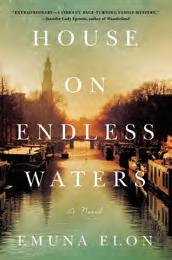
The Pittsburgh Jewish Chronicle invites you to join the Chronicle Book Club for its Aug. 25 discussion of “House on Endless Waters,” by Emuna Elon. Overview: “Renowned author Yoel Blum reluctantly agrees to visit his birthplace of Amsterdam to promote his books, despite promising his late mother that he would never return to that city. While touring the Jewish Historical Museum with his wife, Yoel stumbles upon footage portraying prewar Dutch Jewry and is astonished to see the youthful face of his beloved mother staring back at him, posing with his father, his older sister … and an infant he doesn’t recognize. This unsettling discovery launches him into a fervent search for the truth, shining a light on Amsterdam’s
dark wartime history — the underground networks that hid Jewish children away from danger and those who betrayed their own for the sake of survival. The deeper into the past Yoel digs up, the better he understands his mother’s silence, and the more urgent the question that has unconsciously haunted him for a lifetime — Who am I? — becomes.”
Your hosts
Toby Tabachnick, editor of the Chronicle
David Rullo, Chronicle staff writer
How it works
We will meet on Zoom on Sunday, Aug. 25, at 1 p.m.
What to do
Buy: “House on Endless Waters.” It is available at some area Barnes and Noble stores and from online retailers, including Amazon. It is also available through the Carnegie Library system.
Email: Contact us at drullo@pittsburgh jewishchronicle.org, and write “Chronicle Book Club” in the subject line. We will send you a Zoom link for the discussion meeting. Happy reading! PJC
— Toby Tabachnick






By Kathleen Gianni | Staff Writer
While the Chronicle does not offer a largeprint version of our publication, there are ways for those for whom our text size is too small to access our award-winning journalism. Reference this guide to learn how to enlarge text and enable audio reading on the online version of our publication at pittsburghjewishchronicle.org.
Keyboard shortcuts can allow readers to easily zoom in and out of any browser and enlarge the text of our online publication.
On a Mac computer, holding the keys Command and + will zoom in on the screen, while holding the keys Command and – will zoom out. Holding Command and 0 will return the screen to the default setting. (See photo )
Similarly, on a Windows computer, holding the keys Ctrl and + will zoom in while holding the keys Ctrl and –will zoom out. To return to the default font size on Windows, hold the keys Ctrl and 0.
To enlarge text on a Mac computer, open System Preferences > Accessibility > Zoom and enable Hover Text. (See photo )
After activating Hover Text, readers can use the setting on our website by pressing the key while hovering over the text they want enlarged. (See photo )
Hover Text opens a magnified version of the text in a dedicated window.
Not quite satisfied with the default text size or font? To customize Hover Text, click Options, then use the dropdown options to adjust to your desired settings.
Another way to enlarge text
on a Mac computer is to open System Preferences > Displays. Switch to the Scaled setting from the Default to Display, and select Larger Text. (See photo )
On a Windows 10 computer, change the display by selecting Start > Settings > Ease of Access > Display. Use the slider under the Make Text Bigger section to adjust until the text is your desired size.
If want to make everything larger, choose an enlarged option from the dropdown menu under Make Everything Bigger. Windows 11 users can adjust the text size by selecting Start > Settings > Accessibility > Text size. Drag the slider to the right to enlarge and select Apply when happy with the size. (See photo )
To make the rest of the screen larger, select Start > Settings > Display. Under Scale and Layout, use the dropdown menu next to Scale to make the screen bigger.
To have a Mac computer provide an audio reading of one of our stories, open System Preferences > Accessibility > Spoken Content and check the Speak selection box. (See photo )
Highlight the text you wish to be spoken aloud and hold down the keys Option and Esc to enable an audio reading. To change the voice, speaking rate or volume of the reading, adjust the settings under Spoken Content using the dropdown menu for voice options and the scale for rate and volume.
Enable the Narrator on a Windows computer by selecting Start > Settings > Ease of Access > Narrator. In the Use Narrator section, turn the feature on or off by clicking the button labeled Turn on Narrator. PJC
Kathleen Gianni can be reached at kgianni@pittsburgh jewishchronicle.org.
By Adam Reinherz | Senior Staff Writer
Developers, therapists and students gathered at UPMC Mercy Pavilion to leverage talents and foster a greater ecosystem for assistive technology. The July 11 event, hosted by 412 Ability Tech, demonstrated Pittsburgh’s robust tech community and its need to connect.
During the past 18 months, 412 Ability Tech has mapped 120 local organizations and 900 contacts working in related areas, founder and board member Alexander Geht said.
The difficulty is that different people and companies aren’t aware of each other’s services. Part of the reason for hosting the event is to “make the field much more accessible for all,” the Israeli said.
Nearly 50 people from more than 25 organizations attended the three-hour-long gathering. Participants conversed, discovered mutual interests and toured the UPMC Mercy Pavilion.
A breakout session led by Allegheny Intermediate Unit’s Scott Dougherty and 412x972’s Dror Yaron introduced participants to 3D printing’s simplicity and possibilities.

When a student struggles with a piece of equipment, whether it’s a pencil or paintbrush, 3D printing can “bridge the gap,” Dougherty said.
“And you don’t need to buy a printer,” he told attendees. “Enough people have printers already that are collecting dust.”
3D printers range in price. Some go for as little as $100. Others can top $5,000. A $400 printer can make a 20-cent plastic piece that helps someone hold an item, Yaron explained.

Part of the goal is connecting people who have 3D printers with individuals who could benefit from the tools, Dougherty said.
Another hope, he added, is that attendees will leave this space and “spread ideas.”
Throughout the morning, Yaron carried a white plastic instrument across his shoulder.
The Arcana Strum was developed in Israel by musicians, engineers and designers after Gil, a young girl with cerebral palsy, wanted to learn how to play guitar.
The Strum, Yaron explained, is adaptable and suitable for individuals with physical and intellectual disabilities.
“It is an accessible musical instrument,” he said. “It is more sophisticated than a toy. You can really play serious music and grow your understanding of music.”
Yaron brought the Strum to the event to spark curiosity and connection.
“I know there are people with disabilities that want to play music like that girl. I don’t know where they are, and I’m hoping that people here may run into somebody who does,” he said.
Fellow participants expressed a similar desire to interact and learn.
Carnegie Mellon University graduate student Audrey Reiley told the Chronicle she attended the program to “dip her toes in and see who’s kind of around in the community.”
Classmate Kimberly Blacutt said she
“People who are doing this stuff are often sitting with piles of resources and, on the other side, are people who need it,” Yaron said.


We are honored to congratulate José-Alain Sahel, M.D. on winning the 2024 Wolf Prize in Medicine. This is one of six Wolf prizes in the sciences and arts awarded annually, and the prize is considered to be the second-most prestigious award in science and a significant predictor of the Nobel Prize. Dr. Sahel is the chair and distinguished professor of the Department of Ophthalmology at the University of Pittsburgh School of Medicine and director of the UPMC Vision Institute. He shares the prize with his collaborator, Botond Roska, M.D., Ph.D., professor at the University of Basel. Their prize is “for sightsaving and vision restoration to blind people using optogenetics.”


Anne Frank statue in Amsterdam tagged with ‘Gaza’ graffiti
A statue of Anne Frank in Amsterdam was defaced on July 9, with the word “Gaza” painted in red on the base, JTA.org reported.
The statue sits in a public park near the famous annex where Frank and her family hid from the Nazis, and where they were later discovered.
Mayor Femke Halsema condemned the graffiti, and police are investigating.
“How can you bring yourself to do such violence to her memory?” Halsema wrote on social media. “Whoever it was, shame on you! There is no excuse for this. No Palestinian is helped by defacing her precious image.”
The graffiti is the latest of a growing number of incidents in which pro-Palestinian activists appear to be associating the war in Gaza with the Holocaust. The Amsterdam statue was not the first Holocaust or Anne Frank memorial in Europe to be defaced since Oct. 7.
Meta bans use of ‘Zionists’ as a cover for attacks on Jews or Israelis
The social media giant Meta announced on July 9 that it would ban derogatory or threatening references to “Zionists” in cases where the term is used to refer to Jews or Israelis rather than supporters of the movement to establish a Jewish polity, JTA.org reported.
The change means that posts on Facebook and Instagram will now be removed if moderators determine they use “antisemitic stereotypes, or threaten other types of harm
through intimidation or violence directed against Jews or Israelis under the guise of attacking Zionists,” Meta said in a blog post.
Under Meta’s hate speech policy, users are not allowed to attack people based on characteristics such as race, ethnicity, religious affiliation, disability and gender identity. Existing rules already prohibited using the word “Zionist” to refer to Jews or Israelis in two narrowly defined situations, including “where Zionists are compared to rats.” Meta said that those rules didn’t account for the broad range of ways that people use the term.
Many Jewish groups have accused people of referring to “Zionists” rather than Jews as a cover for antisemitic speech, and some welcomed the announcement, with the World Jewish Congress referring to it as a “landmark decision” in a press release.
4 congregations will share a new synagogue in the heart of Potsdam, Germany
Germany President Frank-Walter Steinmeier recently helped inaugurate a new, multidenominational synagogue center in the city of Potsdam, JTA.org reported.
With a formal blessing delivered by Rabbi Avichai Apel, chair of Germany’s Orthodox Rabbinical Conference, the inauguration means that every state capital in Germany now has its own freestanding synagogue. Potsdam, just west of Berlin, is the capital of the state of Brandenburg.
Now, in a move that is rare in Germany, this four-story, beige-brick building with arched windows will house a handful of congregations
July 22, 1946 — Irgun bombs
King David Hotel
Education (israeled.org), where you can find more details.
July 19, 1999 — Top officer
Stella Levy dies
Stella Levy, who commanded the Israel Defense Forces’ Women’s Corps from 1964 to 1970, dies. She participated in the IDF’s first officer training course for women and oversaw the transit camps for new immigrants.
July 20, 1951 — Jordan’s King Abdullah is assassinated Palestinian nationalists assassinate Jordan’s first king, Abdullah I, at the entrance to al-Aqsa Mosque in Jerusalem. Abdullah discussed peace before Israel declared independence but instead fought and captured the West Bank.
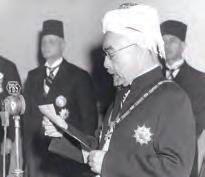
declares
independence of the Kingdom of Transjordan on May 25, 1946.
July 21, 1948 — U.S. opposes stationing troops in Israel
Philip Jessup writes a seven-point memo to Secretary of State George Marshall on why the United States should turn down a U.N. request to temporarily station U.S. Marines in Jerusalem as peacekeepers.
representing different shades of traditional Judaism. It will also be a center for social and cultural events that will be open to the public.
Also unusual is that Brandenburg is partnering in this project with Germany’s Jewish s ocial welfare organization, the Central Welfare Council of Jews in Germany, rather than with the Central Council, the umbrella organization that administers most Jewish communal institutions.
The model means four congregations will no longer have to meet in scattered, improvised quarters — at least not every Shabbat. According to Ud Joffe, president of one of the congregations, the Synagogue Community of Potsdam, they will take turns using the new sanctuary.
Director of national intelligence warns that Iran is funding antiIsrael protests in US
Avril Haines, the director of national intelligence, said Iran was seeking to interfere in the U.S. election and was stoking protests against Israel as it wages war with Hamas, including through funding demonstrations, JTA.org reported.
“In recent weeks, Iranian government actors have sought to opportunistically take advantage of ongoing protests regarding the war in Gaza, using a playbook we’ve seen other actors use over the years,” Haines said in a comment posted to the DNI website. “We have observed actors tied to Iran’s government posing as activists online, seeking to encourage protests, and even providing financial support to protesters.”
Haines, who is Jewish, said that Iran’s activities should not taint genuine protesters
or inhibit robust speech. She said targeted protesters may not be aware they are interacting with a foreign government.
“I want to be clear that I know Americans who participate in protests are, in good faith, expressing their views on the conflict in Gaza — this intelligence does not indicate otherwise,” she said. “Moreover, the freedom to express diverse views, when done peacefully, is essential to our democracy, but it is also important to warn of foreign actors who seek to exploit our debate for their own purposes.”
Last 3 defendants in Lev Tahor cult abduction case sentenced to more than 10 years in prison
Three members of the extremist Jewish Lev Tahor religious cult were sentenced to more than 10 years in prison by a New York court on July 9, JTA.org reported.
Brothers Yoil Weingarten, Yakov Weingarten and Shmiel Weingarten were convicted in March of child exploitation and kidnapping for their role in abducting a 14-year-old girl and her 12-year-old brother from the Catskills home of their mother in 2018.
Shmiel and Yoil Weingarten were sentenced to 14 years in prison, and Yakov was sentenced to 12 years, the U.S. Southern District Court said. The brothers were the last of nine suspects in the case to stand trial, all of whom have been convicted or pleaded guilty. They include Lev Tahor’s leader, Nachman Helbrans, who was sentenced to 12 years in prison in 2022 for kidnapping and transporting minors for sexual purposes and other charges. PJC — Compiled by Andy Gotlieb
Irgun militants bomb Jerusalem’s King David Hotel, the British administrative headquarters in Palestine. Despite phoned-in warnings, the King David is not evacuated, and 91 people are killed.
July 23, 2002 — Knesset enacts
Tal Law on Haredi draft
On a 51-41 vote, the Knesset approves the Tal Law to address the issue of Haredi yeshiva students receiving exemptions from military service. The Supreme Court rules the law unconstitutional in 2012.
July 24, 1920 — Congresswoman
Bella Abzug is born
Bella Abzug, the first Jewish woman elected to Congress, is born in the Bronx to Orthodox Jewish immigrants. She gains experience for a career in politics by lecturing about Zionism at subway stops as a teen.


competitively only after she is paralyzed at 18 in an Israel Defense Forces training accident. PJC

Vigil:
Continued from page 1
weeks, canopies were added. Erected shortly before the noon gatherings and dismantled about an hour later, the tents enabled about 50 people to shield themselves from temperatures climbing as high as 94 degrees.
Point Breeze resident Sandy Zell further helped by dispersing small bottles of water.
A regular at the vigils, Zell told the Chronicle that community members have stood in the blistering heat and the freezing cold.
“It’s the least we can do,” Zell said. “They’re making the ultimate sacrifice.”
Relaying the message
Following every vigil, Squirrel Hill resident Alice Sahel-Azagury said she updates Orna Neutra about the Pittsburghers’ activities.
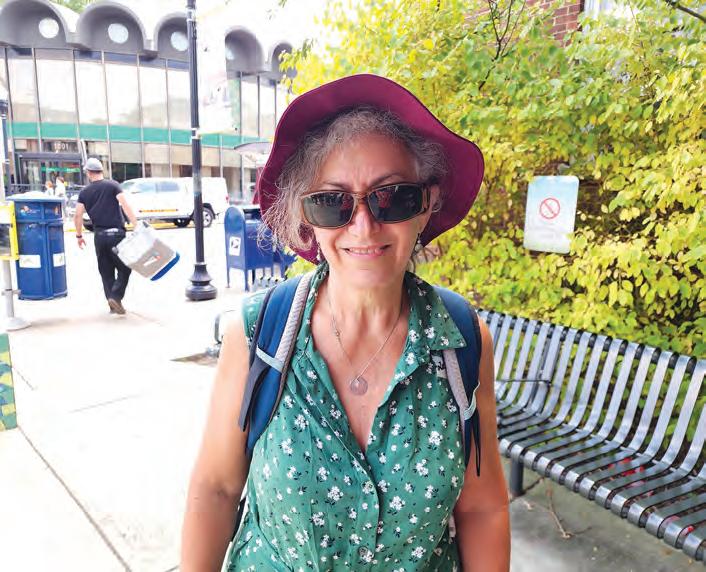
Neutra’s son Omer remains a hostage in Gaza.
“The Talmud says that whoever saves a life saves the world,” Sahel-Azagury said. “We need to continue to pray and hope to see all of the hostages back.”
During Dvir’s two-month visit to Israel, Sahel-Azagury, David Knoll and others helped oversee the gatherings.
Whether it’s through mid-week preparations or for an hour each Sunday, numerous individuals are committed to this cause.
The summer months have drawn a smaller crowd, but about 75-100 Pittsburghers come
Sahel:
Continued from page 1
of the Institute of Molecular and Clinical Ophthalmology Basel and professor at the Faculty of Medicine and the Faculty of Science at the University of Basel, Switzerland.
Sahel and Roska were recognized for their work in “pioneering a novel vision restoration approach by designing and applying optogenetic technology to render surviving neurons in the eye light-sensitive, functionally replacing photoreceptors lost to damage and genetic disease,” according to the Wolf Foundation. “This combination of powerful fundamental human neurobiological discovery research of Roska, with a deep knowledge of the clinical and translational ophthalmology of Sahel, has led to a major milestone in the fight against blindness and in the field of optogenetics more broadly.”
In 2021, Sahel and Roska’s groundbreaking clinical study was published in Nature Medicine. The study was conducted in Pittsburgh, Paris and London, and the findings were the result of more than 10 years of work, Sahel said.
The study focused “on trying to reactivate what we call dormant cells in the retina,” Sahel told the Chronicle. “We are dealing with, in that case, genetic conditions that lead to the degeneration of the photoreceptor cells that capture the light and trigger vision. These cells die as a consequence of a genetic defect, and because this is the first step of vision, many patients go blind, as they don’t usually have any useful vision left. So the idea was to use a mechanism that exists in elementary organisms like algae — very rudimentary organisms that are using the same protein to capture the light and to trigger electrical responses in the cells. And we thought that this could be used, maybe, to reactivate the cells, because instead of replacing all the machinery that is broken, we would use only one protein to do all of that. It took us many, many years to develop that
University of Pittsburgh student Ilay Dvir said that while visiting Israel with his parents this summer he went to the home of Sergeant Major (res.) Nicholas Berger. The IDF soldier died in Gaza in January. Berger’s mother, Diana, spoke at a Pittsburgh vigil via Zoom following her son’s death.
Reconnecting in person and hearing her describe her son, how he lived his life, was a “special moment,” Ilay Dvir said. “Seeing the mom of an IDF soldier be so happy to tell a story, and so strong, even though she lost her child was an amazing sight to see.”
into a therapy.”
“It was a multi-faceted process, and we tested that, step by step, over several years,” he continued. “And eventually, once we identified what we thought was the best and safest combination, we started to test that in patients.”
Because of the pandemic, some patients were unable to complete the study. But a first patient in Paris, who lived near the hospital, continued. That patient, Sahel said, “was totally blind. He recovered part of his vision — not fully though — from this approach.”
The patient was diagnosed with retinitis pigmentosa when he was a teenager; by the time he was 40, he had lost his vision. He stopped working and “started to have a very, very remote life — I mean, just staying home and not doing much of what he used to do,” Sahel said. “And eventually he was the first patient in the study — a very articulate patient, wonderful patient — and he was the first to report his benefit.”
Within months of treatment, the patient could locate and move objects placed before him.
This was the first time that this type of technology was used in any field of medicine, Sahel noted.
The publication was covered by The New York Times and other large media outlets.
“This was a big splash,” Sahel said, “but actually for us, it was just the first step.”
Sahel and his colleagues are continuing their work and are “currently analyzing the data from other patients in the study,” he said, while developing the “next generation of this therapy.”
“In science, nothing is ever finished,” Sahel said. “You just continue working constantly. But this was a big milestone.”
“Importantly,” he added, it was also the result of “a lot of teamwork. I get the credit with my colleague but it was actually the work of many, many people, in Paris, Basel and Pittsburgh.”
Not least of which are the patients.
“It’s all about patients,” Sahel stressed. “I mean, everything we do is really learning
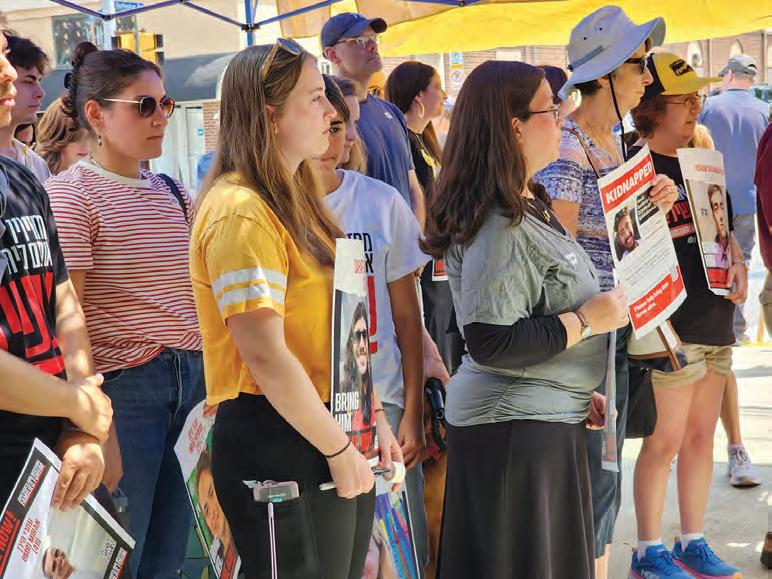
stand with us.”
Erner lives in Yuvalim, a kibbutz in northern Israel, 18 miles from Lebanon.
Last month, Hezbollah launched hundreds of rockets into northern Israel. It was the “largest attack on the country since the war in Gaza began,” ABC News reported.
Chaperoning children to a Jewish overnight camp isn’t easy, especially now, Erner said. “I came here two days ago with a very
from patients. Even the success we could have in some of our patients is really a consequence of their involvement, engagement, and actually a unique motivation to be part of the study. So these people are heroes, actually, because they are exploring the unknown with us.”
Sahel, who was born in Algeria to a “modest Jewish family,” studied medicine at University Denis Diderot, Paris VII, and Ophthalmology at University Louis Pasteur Strasbourg University and Harvard. He founded and, from 2008 to 2020, directed the Vision Institute in Paris.
About eight years ago, Sahel decided to leave France with his family because of rising antisemitism there.
“I thought that there was no real future for my family, my grandchildren,” he said. “Mostly, I was very concerned about my grandchildren’s future. And so we started to explore several opportunities.”
The world-renowned ophthalmologist had offers at some of the most prestigious universities in the U.S., but ultimately came to Pittsburgh, thanks to the recruiting efforts of Dr. Arthur Levine, senior vice chancellor emeritus of Health Sciences and John and Gertrude Petersen dean emeritus at Pitt’s School of Medicine — and the assistance of Levine’s wife, Linda Melada, a realtor, who was able to find Sahel and his daughter’s family homes within walking distance of Orthodox congregations in Squirrel Hill.
The recruitment was supported by Jeff Romoff, then UPMC president, who also commissioned the Vision Institute at the Mercy campus — which replicates the research and clinical institute that Sahel established in Paris — and Leslie Davis, then UPMC senior vice president.
“Dr. Sahel is unique in many ways,” Levine said. “He is a fine retinal surgeon who is also deeply trained and accomplished in basic research. He has a level and breadth of intellectual profundity which reaches far beyond
weekly, includes the number of days since the hostages were captured in Israel and carted into Gaza.
Sahel-Azagury includes the vigil’s address and location. The time and place have remained unchanged for almost nine months. So have the words affixed to the top of each message: “We won’t stop until they’re all back!” PJC Adam Reinherz can be reached at areinherz@pittsburghjewishchronicle.org.
ophthalmology, but early on he recognized that the eye is both a part of, and a window into, the brain — thus he is a wonderful neuroscientist, as well as being a broad and immensely creative scholar. He is exceptionally literate and knowledgeable about the arts and philosophy as well as science and medicine.”
Levine also noted that Sahel is an “accomplished entrepreneur, having started up a number of companies based on research which he directed.”
Sahel has been in Pittsburgh since 2016, and said that he and his family are very happy here.
“People are very kind, very friendly, also very humble,” he said. “It’s a beautiful community.”
Sahel still has strong ties to Paris and travels there regularly, including as a scientific advisor to the French president.
He was in Israel in December and again in March. While there, he spoke to medical residents, discussing his research and careers in science and medicine. The audience included residents who were soldiers in Gaza, as well as several Palestinians, selected by the Palestinian Authority, who train at Hadassah Hospital.
“So in this so-called apartheid country, in the same room, I was talking to a diversity of residents, some of them being Palestinians, some Jewish soldiers, and working together in the same department,” Sahel said. “I had an inspiring discussion together with all of them. Some of the Hadassah trainees actually come to spend some extended time with us in my department in Pittsburgh,” including a Palestinian doing a research fellowship.
The award ceremony for the Wolf Prize — which will be presented by Israel’s President Isaac Herzog — will be held after Israel’s war with Hamas ends, Sahel said. But he will visit the Jewish state before then: His mother and two sisters live there and he is an adjunct professor at Hebrew University. PJC Toby Tabachnick can be reached at ttabachnick@pittsburghjewishchronicle.org.
Groups:
Continued from page 2
confrontation with the oppressors.”
The organization’s local chapter signed onto an open letter penned by the national organization that said, “There will be no classes or compliance with our institutions so long as their shameless profiteering off of our genocide persists.”
The letter demands divestment from Israel, references “colonial institutions,” and claims universities’ “profit and reputation are more important than the lives of Palestinians and the will of their students.”
Kelly Fishman, regional director of the ADL’s Cleveland office, which covers Pittsburgh, said that while it’s important to recognize that groups such as SJP have the right to protest and to exercise free speech, it is also important to make sure these groups are funded internally and not from outside sources, which can be problematic and promote outside agendas.
When groups like SJP participate in activities like encampments “it becomes problematic,” she said.
“When you are infringing on other people’s rights, you are no longer just protesting something you disagree with. You are making it unsafe for someone to attend classes,” she said. “You are instilling fear. When we see red handprints, people with their faces covered, those are ways to intimidate someone.”
Technology:
“didn’t realize that there was such a big and passionate group of people who are working on assistive technology in Pittsburgh.”
“I’m excited as a maker and designer to meet part of that community,” Blacutt added.
Duquesne University student Elyse Barnes attended the event after spending the past year in a fellowship with TOM (Tikkun Olam Makers).
The group, which spans 70 commu nities worldwide, creates and disseminates affordable solutions for people living with disabilities.
Thanks to TOM, Barnes partnered with Geht’s Testa-Seat — the company develops, designs and manufactures custom supportive chairs for children with disabilities — and 412 Ability Tech to “make assistive tech nology, adapt toys and then give them back to the community,” she said.
While ADP and SJP may differ in their university affiliation, one commonality is the relationship they forged with Jewish Voice for Peace.
On its website, JVP claims to be “the largest progressive Jewish anti-Zionist organization in the world,” organizing “grassroots, multiracial, cross-class, intergenerational movement of U.S. Jews into solidarity with the Palestinian freedom struggle, guided by a vision of justice, equality and dignity for all people.”
While numbers are hard to come by, Cherner noted that total membership in the anti-Zionist organization most likely accounts for “less than .05% of the U.S. Jewish population. Compare that to an organization like AIPAC, a Zionist organization that claims to have 3 million members.”
JVP, she said, “represents a small fringe minority within the Jewish community.”
The group’s views, she said, don’t reflect mainstream Jewish beliefs, pointing to a Pew Research Center study where 80% of Jewish Americans said that caring about Israel is important or essential to being Jewish.
StandWithUs MidAtlantic Regional Director Julie Paris said that JVP is “an openly anti-Zionist organization that has always aligned itself with the most dangerous forces seeking Israel’s destruction.”
The organization, she said, works with groups that openly celebrated after Oct. 7.
On the organization’s website, JVP said it was horrified by the massacre committed by Hamas against Israeli civilians but noted “an occupied people have a right to resist, including the use of force. But the targeting of civilians is not permitted.”
“It is our fervent belief that Palestinians gaining their freedom is not only the only viable option for Palestinians, but in doing so, Israeli Jews will be safer too,” the website segment concluded. “The true path to safety is through every single person being able to exercise their rights to safety, dignity and freedom.”
Locally, JVP has held “shivas” for “all the Palestinians and Israeli lives lost.” Conversely, it has participated in a “diein” on Forbes Avenue to “call attention to the genocide currently being enacted on the Palestinian people by the Israeli military in Gaza.”
If JVP has not been effective at making strides into the mainstream Jewish community, it has been successful at providing cover to groups like Pitt Divest from Apartheid and Students for Justice in Palestine, who often reference “Jewish coalition members” or point to Jewish activists at protests. Those remarks can be confusing for those outside the Jewish community who don’t understand or
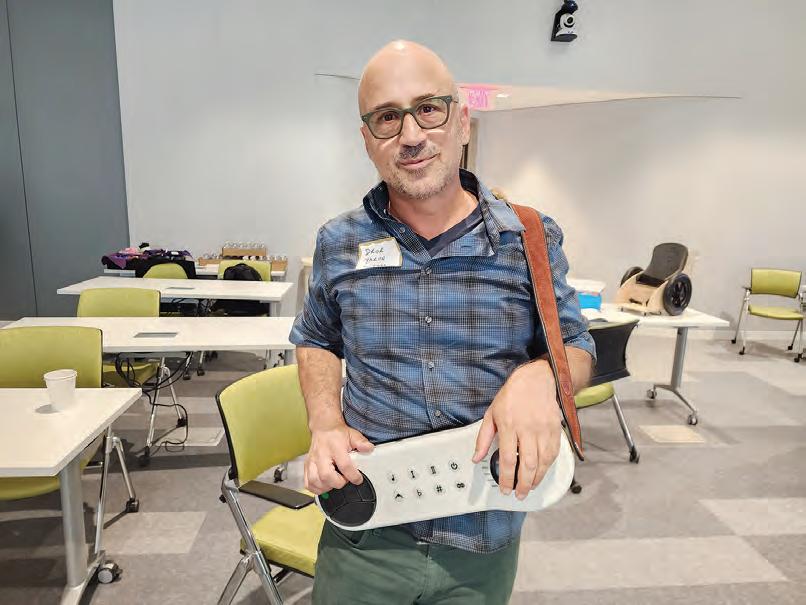
Barnes attended Thursday’s program, she said, because Geht and 412 Ability Tech demonstrate how to “build a community around people who have interests in creating assistive tech and solutions.”
While much of the morning enabled individuals to find new colleagues and explore possible partnerships, participants also toured UPMC Mercy Pavilion.
Ashli Molinero, director of UPMC’s Disabilities Resource Center, led visitors through an apartment designed to help individuals boost independence.
Often used by patients with low vision, or occupational therapists and clients, “this is a
space for people to practice,” she said.
While ADP, SJP and JVP are the largest and most active anti-Zionist groups in the city, there are a host of other groups providing support and sympathy.
BDS Pittsburgh promotes the BDS movement and has called for the arrest of Israeli Prime Minister Benjamin Netanyahu. Against Carceral Tech participates in most of the protests on CMU’s campus and calls for “no tech for genocide.”
The Democratic Socialists of America supported the encampment on Pitt’s campus and the attempt to have Allegheny County Council approve a resolution calling for a cease-fire.
DSA also is circulating a petition to have a referendum placed on the November ballot prohibiting Pittsburgh from “investment of allocation of public funds, including tax exemptions, to companies that conduct business operations with or in the State of Israel unless Israel ends its military action in Gaza, fully allows humanitarian assistance to reach the people of Gaza, and grants equal rights to every person living in the territories under Israel control.”
The referendum is supported by all of the anti-Zionist groups operating in the city, as well as several smaller organizations like the Thomas Merton Center and the Alliance of South Asian Progressives in Pittsburgh. PJC
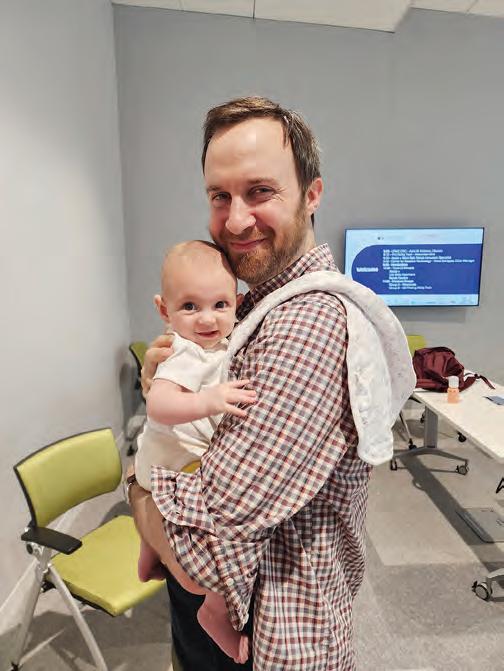
Items were arranged to support and promote a resident’s autonomy. An enlarged timer was placed on the kitchen countertop. The nearby fridge had a bottom-freezer so items were more easily reachable. Buttons for the stove were located on the front of the appliance, as opposed to above, to prevent burns, Molinero said.
Elsewhere in the Pavilion, Mitch Bell, from UPMC’s Department of Physical Medicine and Rehabilitation, welcomed visitors to Assist+, a space for testing assistive technologies.
There was an adaptive trowel, braille LEGO and a button aid. The latter, a small wooden handle with a metal hook on the end, helps people with arthritis or dexterity concerns button a shirt.
Robert Zacharias, an assistant teaching professor at Carnegie Mellon University, marveled at how so many items were easily adapted.
Zacharias, who carried his threemonth-old daughter, Ruth Olive, in tow, said there’s a misunderstanding about assistive technology.
“I think it is so unfortunate that we draw
David Rullo can be reached at drullo@ pittsburghjewishchronicle.org.
this thick-line distinction between those everyday assistive technologies — or just we could say, technologies — and those which are specified to people with a disability,” he said. Whether it’s a table, so one can enjoy dinner without having to place their plate on their lap, or lights, so people can see when the sun goes down, “we are surrounded by assistive technologies that we have built for ourselves.”
The takeaway for students is the same for practitioners, and even “people reading this article,” Zacharias continued.
“All of us can be helpful to each other in many ways,” he said. “You don’t need to be involved in technology or development, and you don’t need to be a professional in the field, to remember that there is meaning and value in using your ability, knowledge, skills and time to contribute to the well-being of other people around you.”
Before closing the event, Geht encouraged participants to reconvene the following week at Winchester Thurston School.
A July 19 event, hosted by Design to Make a Difference and 412 Ability Tech, will showcase how students in grades 7-10 spent two weeks creating assistive technologies.
“What we noticed was that the younger the student is, the less boundaries they saw,” Geht said. “When children understand the needs of others they will grow up with a better understanding of how to be inclusive. And, in the long term, this will be the best for assistive technology.” PJC
Adam Reinherz can be reached at areinherz@pittsburghjewishchronicle.org.
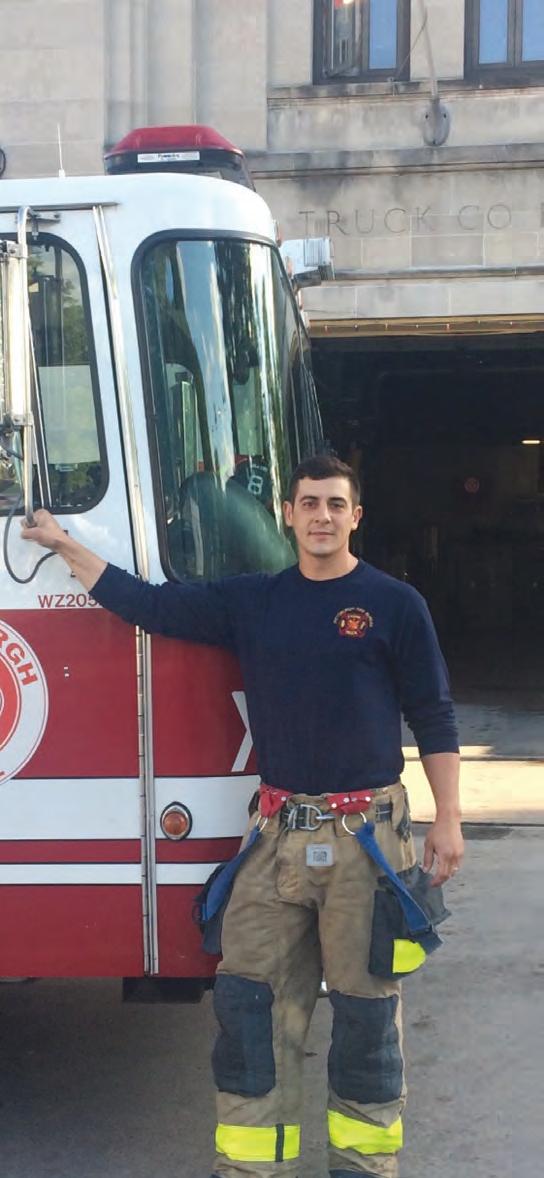
Mopeds weaved in and out from every direction. Street vendors sold produce, and the clack-clack of the Kadima paddles volleying a ball on the beach never
But the war still made itself known. When the conversation turned to those being held for more than nine months in brutal captivity, you could feel the heaviness. Posters with different variations of “Bring them home” were plastered everywhere, the faces of the
my questions about the provenance of an antique gold necklace — and subsequent purchase — was apparent from the warm smiles and hug upon exiting the shop.
Of course, being in Israel wasn’t just about patronizing shops and restaurants. In a very real sense, I felt an obligation to be hyperaware, as I am in my line of work. As a first responder, disasters mean protocol. If there’s a fire, I take orders from my line lieutenant and can get into gear in 60 seconds or less. If
With much certainty, I can say I’ve never quite seen an entire country of people so boldly refuse to surrender.
hostages looking down at us. There was graffiti, billboards, stickers and signs, with words like “I am Israel strong” and “Israel proud.” There were few, if any, tourists.
I’ve been to Israel before, but that was a few years ago. On this trip, in the wake of the attack, I expected sirens warning of airstrikes and an edgy war-torn feel. But that wasn’t it at all.
The streets of Tel Aviv were alive. Cafes were full of laughter and conversation.
At a small restaurant off a side street, the waitress serving us hummus laughed at my American accent when I asked for schug, but we bonded over a shared love of spicy condiments. She told me she hadn’t served a single tourist that whole week, usually the shop’s busiest time of the summer.
At a small antique shop in Yaffo, we made friends with a couple, Maayan and Dani, who promised to visit Pittsburgh. We, in turn, told them we have two extra seats for a fall Steelers game. Their appreciation for
The Democratic Socialists
a fire is on the top of a roof, we use a specific type of chainsaw and climb a tall ladder. We use a special type of pulse-oximeter to gauge pulse rate and oxygen vitals on emergency first-responder incidents.
Everything is spelled out, and we don’t often think about what happens next — we just move on to the next emergency. But after the embers cool, and the hoses are loaded back into the truck, and the ambulance’s engine shuts off, another, quieter stage of disaster response begins.
There’s more work to be done picking up the broken pieces, assessing the damage, and ultimately healing. Part of that healing is showing up to where the bad thing took
place, and refusing to surrender to it. With much certainty, I can say I’ve never quite seen an entire country of people so boldly refuse to surrender.
Every person we encountered in Israel was simultaneously living while trying to heal from the horrific atrocities that took place on Oct. 7. Everyone we met knew someone impacted that day and the days after, and nothing at all felt certain. There is an unknown future and yet a burning desire to Bring Them Home.
Over the five days of my trip, I picked peppers on a kibbutz, rode electric scooters down Rothschild, dined with Community Days School’s future shinshinim, ate fresh produce from Shuk HaCarmel, drank ouzo in the jazz clubs and kicked soccer balls on the beach with the locals. It felt meaningful to be there, and there was an enthusiastic energy all around. But it was also just a great vacation — one where, just by being present, we got to commune with other Jews slowly recovering from disaster.
We could have gone to the Dominican Republic or Europe for a quick getaway from work and kids, but instead, we went to Israel. I am so grateful that we did. Everywhere we went we heard, “Todah shebatem” which means “Thank you for coming.” I also learned the response, “ Todah shebilitem itanu.” It means thank you for spending your time with us. PJC
Doug Frisbee is a City of Pittsburgh firefighter. He lives in Squirrel Hill.
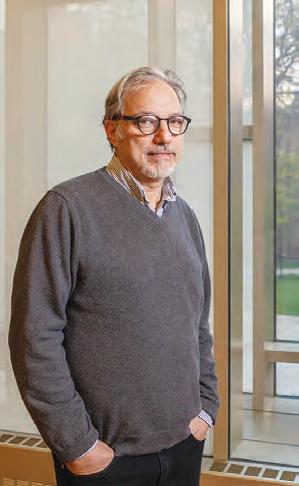
Tover Zionism — and proved their own
nd Stacy Burdett, formerly of the ADL.
During that conversation, Ocasio-Cortez said that “antisemitism, hate and violence against
he Democratic Socialists of America’s decision to withdraw their conditional endorsement of Rep. Alexandria Ocasio-Cortez is a near-perfect illustration of how left-oriented political and cultural organizations are using antiZionist litmus tests to ensure their irrelevance to real-life politics in America. Ironically, that irrelevance extends perhaps most profoundly to the issues leftists profess to care about, like Israel-Palestine. Because the truth is that the intense focus on support for “Zionism” among leftist organizations does nothing whatsoever to threaten the existence of the state of Israel. It merely ensures those organizations won’t be anywhere near the metaphorical “room where it happens” when it comes to influencing the making of policy vis-à-vis Israel and Palestine.
DSA’s announcement came not long after Ocasio-Cortez, who is running for reelection, hosted an online panel discussion about the relationship between antisemitism and anti-Zionism with Amy Spitalnick, chief executive of the Jewish Council for Public Affairs,
criticize Israel in a manner that the accuser does not appreciate. That point is key to maintaining the public’s understanding that
American Jews have been the second-most reliable liberal political constituency in the U.S. for the past half-century, after Black Americans.
Jews because of their identity is real and it is dangerous,” and that “when the Jewish community is threatened, the progressive movement is undermined.”
And she added a point rarely aired in discussions of the dangers antisemitism poses to our polity: “It is also true that accusations and false accusations of antisemitism are wielded against people of color and women of color by badfaith political actors, and weaponizing antisemitism is used to divide us.”
If anything, the conversation should have been seen as a win for the left. Ocasio-Cortez was mainstreaming the common leftist complaint that accusations of antisemitism, especially since the onset of the Israel-Hamas war, are often aimed at people who merely
harsh criticism of Israel’s treatment of the Palestinians is legitimate.
Yet somehow, DSA decided that OcasioCortez’s statements constituted, as they wrote in a statement abandoning their endorsement, “a deep betrayal to all those who’ve risked their welfare to fight Israeli apartheid and genocide.”
What could DSA have to gain from such a move? Together with Sen. Bernie Sanders, Ocasio-Cortez is the most influential leftist politician the United States has produced in decades. She has more than 13 million followers on X, formerly known as Twitter, and another 2 million on Instagram. Her impressive and eloquent performances in Congressional hearings have brought attention to scores of issues that leftists
prioritize, which the powers that be would usually prefer to ignore.
Regarding the war in Gaza, she has gone further in her criticism of Israel’s actions than the vast majority of her colleagues, including by accusing Israel of genocide. She has endorsed the controversial view, put forth by various mainstream human rights organizations both in Israel and globally, that Israel has become an “apartheid state” — a stance that would likely constitute political poison in all but a miniscule number of congressional districts in the United States.
But the job of the progressive politician — which Ocasio-Cortez, unlike DSA’s leadership, understands — is to build coalitions that can work toward creating real change. Statementmaking “no” votes on acts that are bound to pass may be ego-warming, but they cannot be the end goal of progressive politics.
By cutting ties with the most popular politician they are ever likely to ally with, DSA has made it clear how little they care about that essential work.
What would have been good enough for them? According to one piece published by a DSA member on the group’s website, OcasioCortez would have had to meet 11 demands; four of the first five listed address Israel and
Please see Alterman, page 13
Last week, the Chronicle asked its readers in an electronic poll the following question: “At what age do you think a child should get their first cellphone?” Of the 198 people who responded, 25% said 16-18; 41% said 13-15; 28% said 10-12; 1% said under 10; and 5% said “other.” Comments were submitted by 43 people. A few follow.
Kids should not be exposed to cellphones and social media until at least high school.
When they get accepted to medical school.
Ten to 12, if they have stopped losing outerwear.
Sounds like a great “Sweet 16” gift to me! Young kids don’t need a cellphone to distract themselves from real communication and playing. I think it’s dangerous to give them cellphones too young. I know how easily I become distracted by my cellphone!
Alterman:
Continued from page 12
“Zionists.” These include opposing all aid to Israel, “military or otherwise”; embracing BDS; withdrawing her endorsement of President Joe Biden’s reelection campaign “due to his active support of the genocide in Gaza”; and promising never again to “platform Zionists.”
There are two fundamental points that need to be made about these demands. The first is that they would force no palpable change either in U.S. policy or in the lives of the Palestinian people. The second is that they would be politically suicidal for any candidate, anywhere in the U.S. Being a lone voice on a given issue has its purposes, but effectiveness is not one of them.
Questions of pragmatism aside, it’s also curious that the DSA, like so many leftist political and cultural organizations and publications, has made uncompromising opposition to Zionism their sole most fundamental principle. Not, say, economic inequality; increasing threats to women’s reproductive freedom: the rampant mistreatment of immigrants; racist police enforcement; or mass incarceration. All of these are issues with significantly
more relevance to most Americans’ lives than Israel; all are issues on which DSA might reasonably hope to be more influential than on American policy toward the Middle East. There is no indication whatsoever that all the left’s efforts so far have had any impact on the U.S. policymaking that actually affects Palestinians. In fact, just about the only action President Biden has taken to rein in the Israeli attack on Gaza — denying the sale of 500-pound bombs — was recently reversed. Clearly there is not a lot of strategic thinking going on the far left today. As DSA’s choice regarding Ocasio-Cortez tells us, what really concerns them is political purity.
But it’s purity of a strange sort.
I find it a little silly when people talk about decreasing their own carbon imprint, given how little doing so matters given the global scale of the sources of climate change. But at least they’re directly addressing their role in a real problem. Those focused on the ill-defined specter of Zionism are moving in the opposite direction. It’s not as if quitting a high-status literary mag over its publication of a sensitive, thoughtful essay by an Israeli author — as the staff of Guernica did — is going to help anyone. Canceling PEN’s World Voices Festival did not help the people of
Kids under 16 should start with a dumb phone. The real problem is smartphones and social media, not phones in and of themselves.
Mobile phones have become a necessity. But no child under 16 needs one. It would appear that most under 16 use them for texting, social media, etc., and not for emergencies. It’s a waste of money for the family, a total distraction for the child and the source of many antisocial behaviors. We can see the negative impact on our children every day.
I’m a grandma, so I fought this — in my mind — for years, but now I see the helpfulness: You’re available to your kids in an emergency; kids can communicate with each other; you can see where your older kids are when they go out, etc. But as a parent, I would be way stricter than most parents. No phones at the dinner table, for example. No sitting around glued to the phones like
Gaza much, either. The takeover of Hamilton Hall at Columbia, and similar such actions at campuses across the country, have also proved rather short on discernible results.
By insisting on such stringent standards with no visible impact, this segment of the left only succeeds in telling those liberals and leftists who do not share their views — or do not share them with sufficient intensity — that they are not welcome in the ranks of progressive politics. Coalitions, and any chance at actual progress, be damned.
American Jews have been the secondmost reliable liberal political constituency in the U.S. for the past half-century, after Black Americans. At the same time, a declining, but still significant majority of them continue to see their support for the continued existence of Israel as a Jewish state as essential to their personal and collective identities. True, many Jews, especially young American Jews, now consider themselves to be anti-Zionist, but they remain a minority by a considerable margin, and all polls indicate that they will continue to be for the foreseeable future.
Telling some of America’s most loyal liberal citizens that they are not welcome to join the battle against racism, inequality, sexual repression, or even Islamophobia because
my grandchildren are, teenagers all. What are they even doing? It’s scary to ask. My daughter claims she stays up on it and has rules. Hmmmm ... I don’t see it.
Age 16 seems important because the teenager will then be driving. It would be beneficial for the young driver to be able to contact his/her parents or the police, if necessary.
It depends on the child’s needs and level of responsibility.
Bar/bat mitzvah or confirmation gift. PJC
— Compiled by Toby
Tabachnick
Chronicle weekly poll question: Do you think that politicians will tone down their rhetoric as a result of the assassination attempt on Donald Trump? Go to pittsburghjewishchronicle.org to respond. PJC
they think BDS is misguided — or would like to see a “two-state solution,” however unlikely, rather than a “Free Palestine from the river to the sea” — is not merely insensitive. It is also incredibly stupid. To the degree it divides, weakens and destroys the relevance of the left, it increases the likelihood that the country will fall victim to the reelection campaign of former President Donald Trump, who has begun to use “Palestinian” as a catch-all slur, and is sure to give Israel substantially freer rein in not only its war in Gaza, but also its sub-rosa annexation of the West Bank. With him will come his MAGA movement’s homegrown version of fascism; one in which the most vulnerable among us — precisely those the left is supposed to want to protect — are certain to suffer the most. It will begin, alas, with the Palestinians. PJC
Eric Alterman is a CUNY Distinguished Professor of English at Brooklyn College and an author, most recently of “We Are Not One: A History of America’s Fight Over Israel.” This story originally appeared in the Forward. To get the Forward’s free email newsletters delivered to your inbox, go to forward.com/ newsletter-signup.
Michael Oren’s false syllogism
Michael Oren’s op-ed, “The brutal syllogism of this war is a deathtrap for Israel” (July 5), is based on a false syllogism. He explains that if A equals B and B equals C, then A equals C. In his argument A is Hezbollah won’t accept a cease-fire unless Hamas does, and B is Hamas will not agree to a cease-fire. From these two premises, it can only follow that C: Hezbollah will not agree to a cease-fire, rather than the conclusion that Israel will go to war against Hezbollah. Michael Oren is, of course, free to argue any position he likes, but he should not blame Aristotle or the syllogism. Logic is logic. In fact, The Times of
Letters may not
and
be
Israel recently reported that Hassan Nasrallah, the head of Hezbollah, has declared that if Hamas reaches a cease-fire deal with Israel, Hezbollah will also cease attacks. Hamas and Israel, through intermediaries, now seem closer to reaching a cease-fire agreement. Wouldn’t that be preferable to an interminable war that can only lead to unending death and destruction on all sides and make the rescue of the surviving Israeli hostages less likely? Jacobo Bielak Squirrel Hill
and
they cannot be returned. Send letters to: letters@pittsburghjewishchronicle.org or Pittsburgh Jewish Chronicle, 5915 Beacon St., 5th Floor, Pittsburgh, PA 15217
We regret that owing to the volume of correspondence, we cannot reply to every letter.
By Jessica Grann | Special to the Chronicle
I’ve never seen a holiday meal, let alone a summer barbecue, that didn’t include a big platter of deviled eggs ready to be devoured. They are one of my childhood favorites that I will never refuse.
Deviled eggs kindle nostalgic memories and, since they’re pareve, they go with everything, which is a plus.
I’m sharing the easiest way to get perfect hard-boiled eggs that peel well, as well as a deviled egg salad recipe for those who want this taste in a dip.
Perfect hard-boiled eggs:
Start with a dozen eggs at room temperature. My mom always swore that using eggs that have been in the fridge for a few weeks is the best way to get eggs that peel well. I mark the egg carton, so I know exactly when I bought them. Using older eggs along with a cold water rinse and soak does the trick every time, and the eggs don’t turn gray or overcook.
Place the room-temperature eggs in a saucepan in a single layer if possible. If a few pop up over the others in the pot, that’s OK. The right size pot matters when making hard-boiled eggs. If there is too much room, the eggs roll around too much when boiling, and the shells crack more easily.
Cover the eggs with a few inches of cold water and boil them over medium-high heat. Once the water is boiling, cook them for exactly 10 minutes and not a minute more. The eggs should be at a medium rolling boil. They should be boiling and moving around but the water should not be as hot as it would be when you’re making something like pasta. If the water is at a full rolling boil, reduce the heat a bit to soften the boil.
When they have cooked for 10 minutes, take the pot to your kitchen sink, dump out as much of the hot water as possible and fill the pot to the top with cold water. Repeat this process 4-5 times over 10-15 minutes, until the water and pot no longer feel warm. Pour off the water once more, fill the pot with cold water and let the eggs rest for an hour to completely cool in the water.



After they are cool, gently tap each egg to crack the shell against the side of the pot in one area, then put the eggs back in the water for 15 minutes. The last step helps the water get under the shells and makes peeling much easier; I often peel them under water. Gently crack them on the pot, counter or cutting board again and peel the first part of the shell that is ready to come off, lifting the skin-like membrane away from the egg. Dip them several times while peeling the shell. Dip, peel, dip peel — and just let the shells fall into the pot of water to be discarded once this task is complete.
After peeling, rinse each egg in cool water and put it aside on a paper towel to dry. This will make perfect hard-boiled eggs every time. You can prepare these right away or line a container with a paper towel before adding the peeled eggs. Cover tightly with a fitted lid or plastic wrap.
Deviled eggs:
1 dozen large eggs, cooked as instructed above
½ cup of mayonnaise
1 tablespoon yellow mustard
A pinch of salt
1-2 tablespoon relish of your choice, optional
Sweet paprika to lightly dust the tops


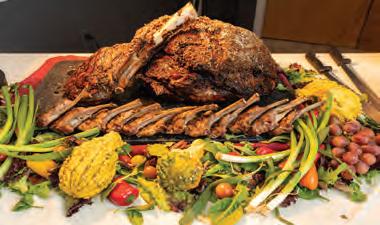
Here’s an alternate dip version that is served in a bowl. I love this so much that I can eat it for breakfast, and I often serve it at parties and for Shabbat meals with the salad course.
Deviled egg salad/dip:
1 dozen large eggs, cooked as instructed above
¼ teaspoon garlic powder
¼ teaspoon onion powder
¼ teaspoon salt
½ teaspoon sweet paprika
Black pepper, freshly ground, 1-2 grinds for flavor
¾ cup mayonnaise
1 tablespoon yellow mustard
2 tablespoons sliced spring onions and extra for garnish
Cut the cooled eggs in half lengthwise, and gently scoop the yolks into a mediumsized bowl. Use the back of a fork to mash the yolks as finely as possible, or use a pastry blender to get them mashed quickly.
Add the mayonnaise, yellow mustard and a pinch of salt to the bowl and mix well with a rubber spatula.
If you’d like to add relish (sometimes I fill half plain, then add relish to the remaining mixture and make half with relish) mix it in now. Use a small spoon to scoop the mixture into the well of the egg. Some people find it easier to scoop the entire mixture into a medium-sized plastic bag, cut a small hole into one corner of the bag and squeeze the mixture into the boiled egg whites just as you would with a pastry bag.
Place them on a platter and dust them with sweet paprika for color and a little bit of flavor.
If you’re making these ahead of time, line the platter or storage container with a paper towel to pick up extra moisture while they rest. Cover the eggs with plastic wrap until you’re ready to serve them. In this case, dust the eggs with paprika just before serving.
These last for 2-3 days in the fridge.
I have tried preparing this in one bowl and mashing the eggs whole, all at once, but the consistency of the dip is nicer if the yolks and egg whites are mashed separately. Cut each egg lengthwise. Place the yolks in one bowl and the egg whites into a second bowl. Mash the egg yolks first with the back of a fork or a pastry blender until the mixture is fine and without any lumps. Add the garlic powder, onion powder, paprika, salt and pepper to the egg yolks and mix well. Add the mustard and mayonnaise and mix well with a rubber spatula. Mash the egg whites with the back of a fork or pastry blender as finely as you can. Small chunks are OK, but you don’t want any large pieces of egg white in the salad. Pour the egg whites into the yolk mixture and mix well with the spatula.
I typically add ¾ cup of mayonnaise, but you can add a few more tablespoons to taste. Add the green onions if desired, cover with plastic wrap and serve once chilled. You can garnish the top with more green onions and dust a bit of sweet paprika across the top for color.
This dip keeps for 2-3 days if covered well and refrigerated.
I hope my tips help your everyday preparation of hard-boiled eggs, and that these two versions of deviled eggs are enjoyed at your table. Bless your hands! PJC
Jessica Grann is a home chef living in Pittsburgh.

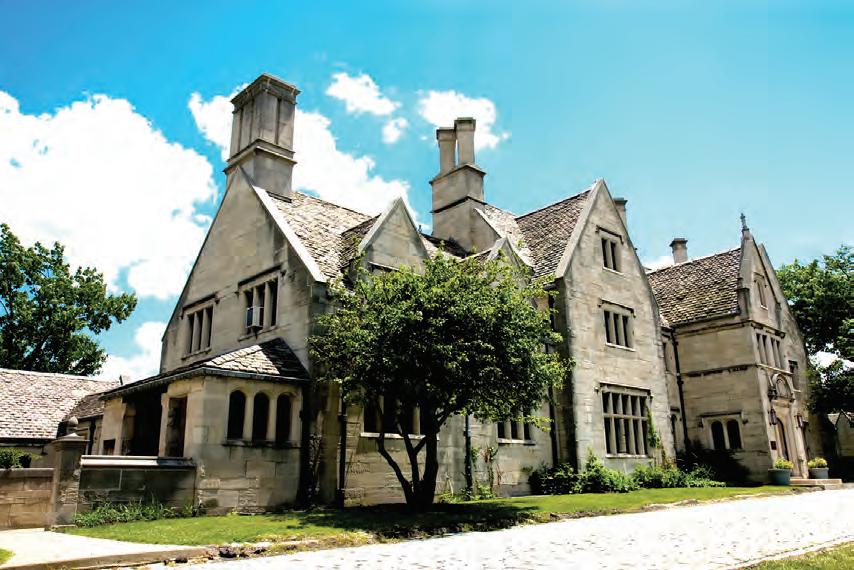
By Kathleen Gianni | Staff Writer
Summer adventures abound just a short drive from Pittsburgh, offering everything from cascading waterfalls to a lively music scene.
Whether you’re looking to fill a free day or seeking a quick escape, these four destinations are perfect for your next summer day trip.
Presque Isle State Park – 2 hours
Just a straight drive up I-79, Presque Isle State Park in Erie, Pennsylvania, makes for the perfect sandy beach getaway.
Presque Isle State Park boasts nine beaches equipped with various amenities, like picnic pavilions, beach volleyball courts and concession stands. With rentable water toys, you can spend your day afloat with paddle boards or kayaks.
After visiting the beaches, check out Presque Isle Lighthouse and Erie Land Lighthouse. The two lighthouses are open to

While Seven Springs is mostly known as a winter destination, the ski and snowboarding resort makes for a great summer getaway with activities and events all year long.
Look into the weekly activities occurring this summer at Seven Springs. On Wednesdays, Helen’s Restaurant hosts Jazz Nights, while on Thursday nights, Foggy Goggle has trivia and karaoke.
Visiting over the weekend? Foggy Goggle’s concert series occurs on Fridays and Saturdays throughout July and August.
Consider visiting during the 31st annual Seven Springs Wine Festival from Aug. 23-25. The festival showcases wines from across Pennsylvania with tastings, seminars and music.
Make the most of your day trip by buying an all-day adventure pass to gain access to all of the resort’s summer activities, like swimming and disc golf.
Take a scenic ride up the mountain on the chairlift to access the alpine slide. The two-wheeled sled twists and turns down a curvy track built on 1,980 feet of a ski slope and is operated with a handbrake for speed control.
Start with a combination of hiking and biking on a stretch of Ohiopyle’s 79 miles of trails. With trails that range from easiest to most difficult, visitors can opt for a short day hike or a challenging mountain biking route.
After your first adventure, stop to admire one of the park’s waterfalls. Cucumber Falls is a 30-foot waterfall accessible from the Cucumber Falls trailhead or by hiking the Great Gorge Trail. The waterfall is both a must-see photo opportunity and a chance to cool off from the summer heat.
Consider stepping away from the park to see nearby attractions, like Fallingwater or Laurel Caverns.
Fallingwater serves as a historical landmark, built in 1935 by architect Frank Lloyd Wright. The house is lauded for its architecture, blending art and nature. Since the house was donated to the Western Pennsylvania Conservatory in 1963, the landmark is open to the public.
Laurel Caverns is a quick 30-minute drive from Ohiopyle, a trek worth making to see Pennsylvania’s largest cave. Take a tour to explore the more than four miles of passages in the cave.
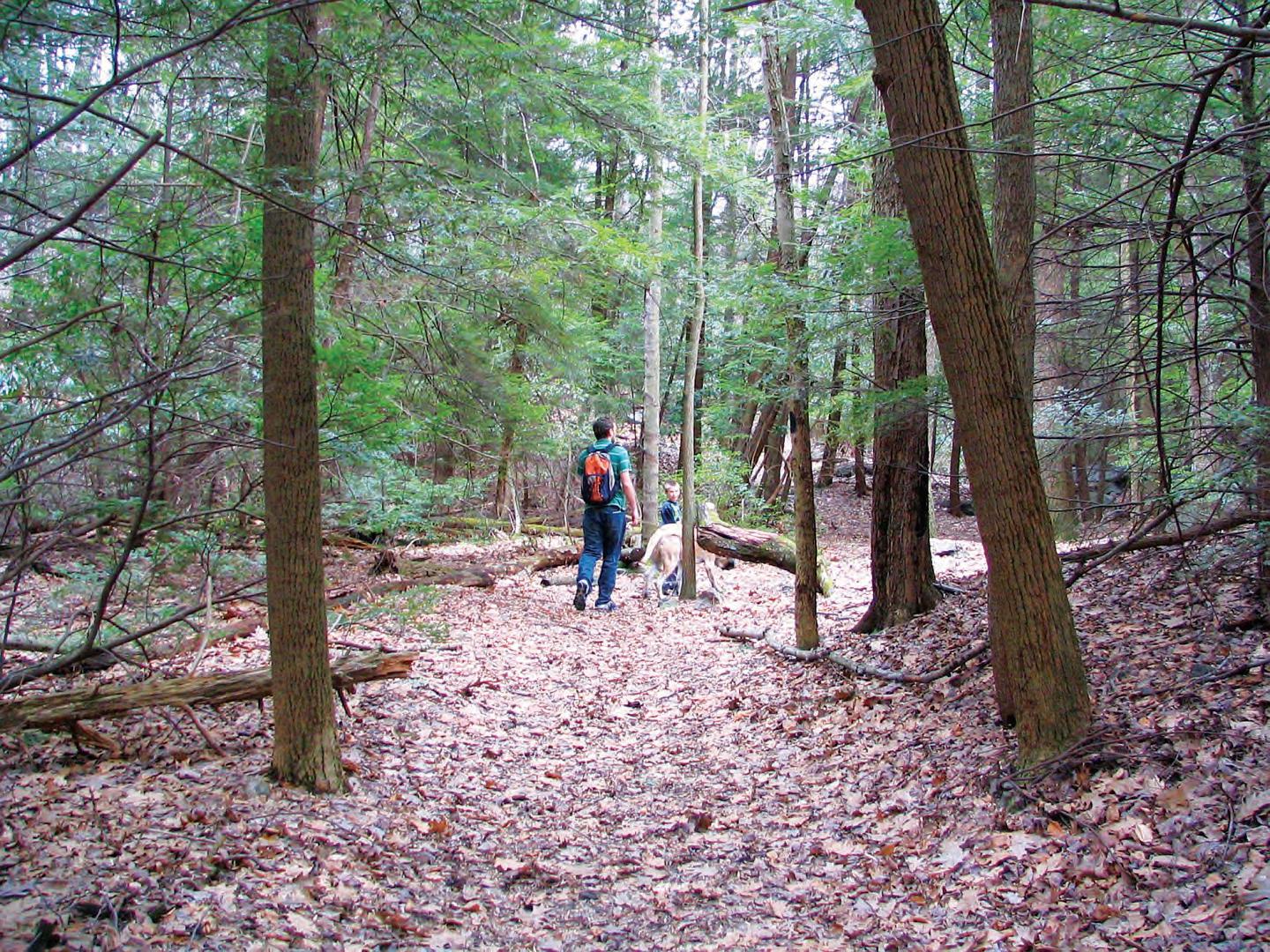
Head to Kickstand Ice Cream Parlor to finish your trip on a sweet note. With 32 Hershey’s Ice Cream options, ranging from salty caramel truffle to strawberry cheese-
Hartwood Acres Park – 30 minutes
Located just 10 miles northeast of Downtown Pittsburgh, head to Hartwood Acres Park to spend your day a bit closer to home. The park lies on 629 acres, stretching across Hampton and Indiana townships.
Book a tour at the Hartwood Mansion, a main attraction. The Tudor-style estate, built in 1929, features a cottage, garden and stable complex.
The estate has about 30 miles of trails, making it an opportune spot for hiking, biking and horseback riding.
Hartwood Acres Park’s sculpture garden is another must-see attraction, containing 14 abstract sculptures along an accessible pathway. Consider booking a guided walk to spectate and discuss the art pieces with the park rangers.
Finish your day with live music at the Summer Concert Series every Sunday at the park’s amphitheater. The weekly concerts feature live performances of different genres, including MAGIC! and the Pittsburgh Ballet Theatre. The Summer Concert Series concludes on Sept. 1 with the annual Allegheny County Music Festival. PJC
Kathleen Gianni, a student at George

Continued from page 3
Tombosky was able to manifest that belief, creating GIFT, a nonprofit whose mission is to foster intergenerational community volunteerism and connection, bridging the gap between seniors, university students and the wider community.
The Rebbe’s mission, she said, wasn’t to create followers; it was to create leaders.
“It was how many people can I bring to their fullest potential and then they can touch hundreds and thousands,” she said.
One of those leaders inspired by Schneerson is Rabbi Yisroel Rosenfeld, head shaliach of Western Pennsylvania and the rabbi of the Lubavitch Center of Pittsburgh. He said his relationship with the Rebbe began in 1965 and was just as often personal as it was spiritual.
“When I got married in 1975, I went to the Rebbe’s office to receive a blessing,” he said. “Then, on a continual basis, we had the opportunity to write to the Rebbe on any personal issue or note that I wanted to write about or get advice from the Rebbe on.”
Schneerson, he said, would personally respond, an effort Rosenfeld considered extraordinary considering the national and international figures the Jewish leader was corresponding with regularly.
The Rebbe’s advice eventually influenced Rosenfeld’s decision to become a rabbi and where to serve the Jewish community. He remembered that once Schneerson asked for volunteers to move to Israel with their families.
Rosenfeld applied but was told by the Rebbe to move to Pittsburgh instead.
“He felt that our place in the world to make a lasting effect on in the best way possible was Pittsburgh,” he said. “When the Rebbe said
something, we thought, ‘Of course, this is the way it is.’ We had no second thoughts. When he said I should go to Pittsburgh I felt, ‘Here we go. Now I know where I should be and now, I know I have to do the best I can to have the right effect on the community in whatever way possible.’”
Schneerson, Rosenfeld said, inspired and directed people in the way they should live their lives. Three generations have been motivated by the Rebbe’s vision, Rosenfeld said, pointing to his children and grandchildren who have all learned from the Rebbe’s teachings.
In Pittsburgh, one of those rabbis inspired by the Rebbe without ever meeting him is Yitzchak Goldwasser, rabbi at Chabad of Greenfield.
Despite Schneerson’s death three decades ago, Goldwasser said, Chabad is bigger today than ever, with emissaries worldwide.
The Rebbe’s message, he said, continues in three important ways: Through relationships with people who knew and were taught by the
Rebbe; by the writings and teachings left behind by Schneerson; and by the new generation of Chabad leaders.
While the Rebbe had no children, Goldwasser said, he “now is through each and every one of us. We no longer have the luxury to be spoon-fed or be held by the hand and guided in every decision. We have to go out and be and promote the Rebbe’s mission.”
That sentiment was echoed by Rosenblum. “The Rebbe empowered us,” she said, “to go out and be an ambassador for good. We continue the work. He empowered every person to be the best you can be and to make a difference where you can, to affect someone without any title or official group. You don’t have to be a spiritual leader. If you know an aleph and someone doesn’t, you teach them that.” PJC
David Rullo can be reached at drullo@ pittsburghjewishchronicle.org.
By Judy Lash Balint | JNS
Yad Vashem, the World Holocaust Remembrance Center in Jerusalem, last week inaugurated a new home for the world’s largest collection of Shoahrelated materials.
Donors, dignitaries, Yad Vashem staff and survivors gathered to mark the opening of the Moshal Shoah Legacy Campus, which includes the David and Fela Shapell Family Collections Center. The Legacy Campus brings together under one roof a state-of-the-art facility for the collection, conservation and preservation of tens of thousands of Holocaust-related items gathered over decades from survivors and their families.
Along with the artifacts, more than 230 million pages of testimony and documents, and a half-million photographs, will now be stored and preserved in optimal conditions in the new six-story building at the center of the Mount of Remembrance where Yad Vashem is located.
“These are our crown jewels,” Yad Vashem chairman Dani Dayan told the audience at a concert commemorating the opening. “They are a living testament to Jewish history. We have a moral imperative to safeguard our heritage.”
By the end of the 1960s, around half a million survivors of the Holocaust had immigrated to Israel. In the 1990s, they were joined by tens of thousands of Jews f rom the Former Soviet Union who survived the Shoah. Among the treasured possessions many of these people managed to bring to Israel were diaries, photos, art depicting their experiences, documents illustrating Jewish life before and during the Holocaust, items of Judaica, prayer b ooks, musical instruments and toys that had provided comfort during their ordeal.
Over the years, particularly after the opening of Eastern Europe in the late 1980s, Artifacts Collection staff from Yad Vashem traveled all over the world to gather items. With the opening of the Holocaust History Museum at
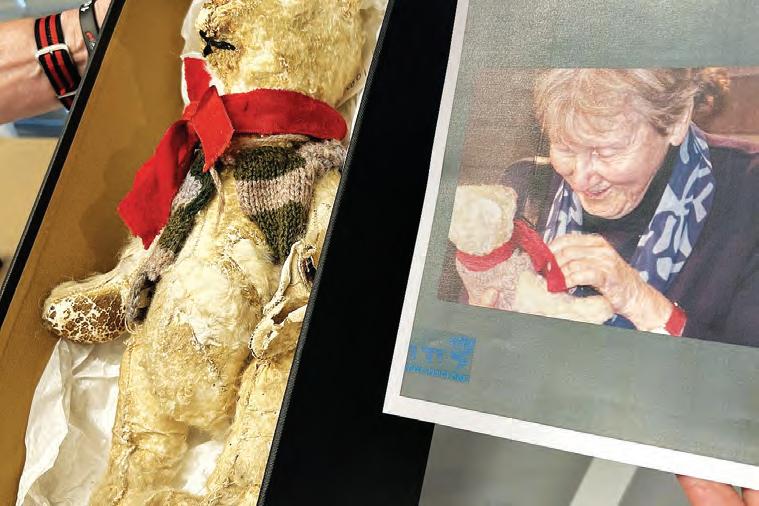
Yad Vashem in 2005, more than 1,000 items were put on public display for the first time.
In 2011, a formal program called Gathering of the Fragments was launched in Israel urging anyone with Holocaustrelated items at home to bring them to Yad Vashem to be preserved, cataloged and digitized before they decayed. Tens of thousands of artifacts have been collected and exhibited over the past 13 years.
S everal precious musical artifacts were used at the commemorative concert to mark the opening held at the Jerusalem Theater. Jerusalem Symphony first violinist Janna Gandelman played a violin with its Yad Vashem preservation tag hanging from its neck, and four of the orchestra’s violinists used instruments that had belonged to Jews before and during the Shoah that were rescued by Violins of Hope.
One violin that was owned by Motale Shlain, a Jewish partisan killed by Nazis, made its way to Yad Vashem via a fellow partisan who survived. The instrument is part of the Artifacts Collection and was used at the Jerusalem concert by violinist Mordechay Shenvald to play the theme from Steven Spielberg’s 1993 film, “Schindler’s List.” Shenvald, an IDF reservist and grandson of an Auschwitz survivor, was severely wounded in battle in Gaza in late October 2023
and attributes his recovery to the use of music during his complex rehabilitation.
On a recent visit to the textile conservation lab at the new Moshal Shoah Legacy Campus, a battered teddy bear donated by Stella Knobel lay in a box waiting to be reshelved. Knobel, born in 1931, received it as a gift for her seventh birthday in Krakow, Poland. She was one of the “Tehran Children” who arrived in Palestine in 1943, clutching her teddy bear. When she gave the bear to Yad Vashem, she said, “He’s part of my family, the last remnant of my home in Poland. I know that in Yad Vashem he’ll be taken care of. The thought that he could be thrown in the garbage is terrible to me. It (the teddy) is symbolic of my life.”
‘A balance between past and future’
Simmy Allen, head of Yad Vashem’s International Media Section, tells visiting journalists that it was a very difficult process for Knobel to part with the childhood treasure, but “we worked together with her family to acquire it, because it’s important to showcase what life was like for children during the Holocaust.”
Allen points out that it took a worldwide search to find qualified professionals in the conservation and restoration field to staff the Center. Sarah Reichert, an art conservator,
made aliyah from Paris; photo conservator Reut Ilan-Shafik was trained in Berlin, and textile conservator Nada Reizman hails from St. Petersburg.
One exception is document conservation expert Yuval Siton, who was trained in Israel and has worked at Yad Vashem for 22 years. Items that have passed through his hands over those years include postcards sent by Anne Frank; poems of paratrooper and Holocaust rescuer Hannah Senesh; and the blueprints of the Auschwitz death camp.
Because of the fragile nature of the artifacts, the conservation and preservation labs are not open to the public, but the building is designed around a sunken courtyard with windows that look into the labs.
“The facility was designed to strike a delicate balance between conservation and accessibility, between past and future,” says Dayan.
In the art lab, Sarah Reichert is working on several large canvases. She notes that there are some 1,000 oil paintings at Yad Vashem, “and they are not Rembrandts. A minor amount of the artwork that we have here is actual oil paint; the majority is drawings on scraps of paper and the rest are more items that were drawn on anything and everything that you can imagine, from eggshells to sacks of potatoes.”
She says that “every painting has multiple stories of what it depicts, who created it, how it survived and how it arrived. If we bring back a painting and realize that it was created under the most horrific conditions that could possibly be thought or even imagined, the fact of the matter is that our job is to document, to keep the memory of the Holocaust for generations to come.”
Reichert explains that her efforts are not to restore the artwork, but rather to maintain it and preserve it in the condition in which it arrived at Yad Vashem, or at least in the condition in which it was found after the Holocaust, “because every burn mark, every stain, every hole, every pattern on a piece of paper has a story of its own.”
Many of the artworks and artifacts are viewable on the Yad Vashem Online Exhibition section in eight languages. PJC
— BOOKS —
By Mira Fox | Forward
Surely, here in 2024, decades after the Holocaust and pogroms of Eastern Europe, American Jews are no longer defined by trauma and neuroticism. The epigenetic inheritance must wear off eventually — right?
For a time, Jewish literature, film and TV was dominated by the likes of Philip Roth and Woody Allen and even Larry David, all of whom depicted a Jewishness that was high-strung and nebbish. Their work focused on the fallout of traumatized immigrants to the U.S. and, later, their children, trying to assimilate, struggling to balance the broad cheer of America with their own, Old Country anxieties.
Taffy Brodesser-Akner’s debut novel, “Fleishman is in Trouble,” immediately drew comparisons to Roth, for the sex obsession of Toby, the novel’s titular lead, and for the rapid pace of her prose. But where Fleishman was acclaimed for its perspective-flipping narration, its slow reframing of its hero into an antihero, its upending of the divorce novel’s tropes, her new novel, “Long Island Compromise,” goes back to (Jewish) basics: visceral, all-consuming, generational anxiety.
The novel follows the younger generation of Jews in the Fletcher family, heirs to the wealth of a Long Island Styrofoam factory started by their grandfather who, yes, survived the Holocaust.
The trauma of the Fletchers, however, is less born of the Holocaust than of the kidnapping of their father, Carl, who is taken from his own Long Island mansion’s driveway in the opening flashback scenes of the book and held captive for days in, as it turns out, the basement of his own factory. (The kidnapping is loosely based on the real-life kidnapping of Jack Teich, a family friend of Brodesser-Akner.)
This is not a book about a kidnapping, though. It’s about the aftermath: the trauma of that one week, decades ago, echoing through the adult lives of Carl’s three children, Nathan, Beamer and Jenny. Nathan, terrified of risk, lives as boring and controlled a life as possible. Beamer, the middle child, has turned to drugs and sex. And Jenny, who was in utero for the kidnapping, sleepwalks through her life — literally falling asleep any time things get too stressful.
Brodesser-Akner’s writing surges along with a propulsive, instinctive anxiety. Maybe it’s Beamer trying to pitch a screenplay while on a confusing cocktail of speed and Ambien or Jenny sleeping through her classes every time she wonders if a graduate degree is really the answer to her life’s quandaries. Regardless, the defining emotion of each character, each scenario, each page is fear, manifested in all its different forms: fear of disaster,

fear of failure, fear of becoming your family and fear of leaving them behind.
“Long Island Compromise” is full of very Jewish details: there is family drama over Beamer’s gentile wife naming their children Liesel and Wolfgang (a shanda), there are detailed b’nei mitzvah, there are nose jobs, there’s the Yiddish rhythm that colors each of Brodesser-Akner’s sentences (“I hope you have what to wear”). Each Fletcher feels like a recognizable modern JewishAmerican archetype: the Long Island lawyer, the Hollywood bigwig, the union organizercum-intellectual. But it’s the constant undercurrent of anxiety that makes the novel feel so very Jewish.
There has to be more to say about it all. There has to be something else to being Jewish.
The fact that Jewish anxiety is a well-trodden topic doesn’t make it any less engrossing to read about. Brodesser-Akner’s writing is propulsive, and the same attention to detail that made her a renowned profile-writer at GQ and The New York Times is paid to each of her characters, each of whom feels like an entire world unto themselves. She has the reader living inside Beamer’s racing thoughts, and then again inside the safety and routine Nathan finds in endless legal paperwork. Brodesser-Akner’s exploration of Jenny’s hatred toward her own wealth and privilege, even as she could have never done the social justice work she believes is morally superior without her trust fund, is as empathetic as it is a biting social commentary.
But there’s an extent to which it feels like we’ve been here before.
Roth and Allen and the rest of their ilk present Jewishness as neuroticism, an obsession with sex or a fixation with intellectualism. And each Fletcher child is neatly assigned one of these conditions. Nathan is the neurotic, taking out every kind of insurance policy he’s ever heard of, just in case. Beamer is obsessed with the goyisheness of his blonde, Protestant wife — she’s named
Our relationship to trauma changes over the generations. And the Fletcher kids have a secret about their trauma: They love it.
out so that he can feel helpless.
And Jenny, well, she hates her family, their wealth, their fears — and the kidnapping is what allows her to differentiate herself from the other wealthy mavens of her upbringing. She gets to be deep. She gets to be special.
Brodesser-Akner is at her best at the end of the book, pulling the threads together to critique the ways in which trauma is, at least a little bit, fetishized: an excuse for bad behavior, an enviable claim to fame.
Noelle for G-d’s sake, but he also visits every imaginable type of sex worker. Jenny intellectualizes her distaste for her own family in terms of the politics of capitalism.
There has to be more to say about it all. There has to be something else to being Jewish.
And there is. Our relationship to trauma changes over the generations. And the Fletcher kids have a secret about their trauma: They love it.
Nathan was a terrified neurotic child before his father was ever kidnapped — and when something bad actually happened, he felt relieved and safe. Everyone around him was suddenly seeing life the way he always had: as something terrifying. Finally, he didn’t have to warn them how dangerous the world is: “When he was faced with what was absolutely incontrovertible emergency — one that no one could argue with — this is when the world finally started making sense to him,” Nathan remembers of the kidnapping.
Beamer, meanwhile, seeks kidnapping in all his pursuit of pleasure. He hires dominatrixes to act as though they’re robbing him, takes drugs that knock him
It’s a point that gets at the heart of the American Jewish experience today. In a world of identity politics, of the elevation of lived experience, having a special minority identity is its form of power. It’s a way to be unique, to be less complicit in the crimes of America. After all, we’re Jews — there’s still antisemitism. The Holocaust wasn’t that long ago. In the past, anxious Jews sought desperately to repress their trauma; today, Jewish or not, modern wisdom says to give it space to breathe. To talk about it endlessly. The body keeps score and so forth, so why not embrace it?
“How can you get over anything if it all is just constantly happening?” wonders Carl, the kidnapped patriarch, in his later years. “Post-trauma. Anyone who named it that didn’t really understand it. There is no post. There’s only trauma. Over and over. Time moves on but you stay there forever.”
But don’t we all have our own forms of trauma — is anxiety really so Jewish anymore? The Fletchers are Jewish, sure, but unlike the previous generations of American Jews, anxious about achieving the American Dream, the Fletchers already have it. Even their trauma isn’t particularly Jewish; anyone could be kidnapped.
Assimilation, it turns out, doesn’t protect against trauma. Nothing does. The question is: What next? PJC
This story originally appeared in the Forward. To get the Forward’s free email newsletters delivered to your inbox, go to forward.com/newsletter-signup.

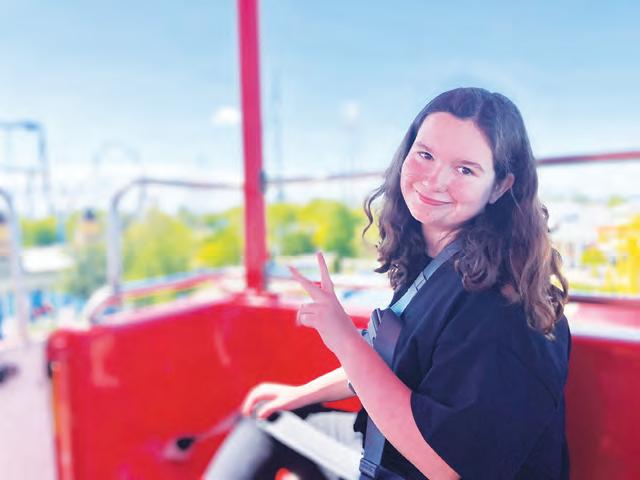
Gwenyth Anne Kramer , daughter of Scott and Deirdre Kramer, will become a bat mitzvah at Adat Shalom during Shabbat morning services on Saturday, July 20, 2024. Grandparents are the late Glenn William Kramer, the late Diane Faye Kramer, F. Thomas Casey and the late Doris H. Casey. PJC
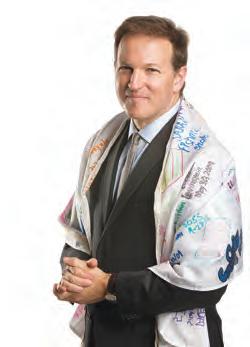
Parshat Balak
Numbers 22:2 – 25:9
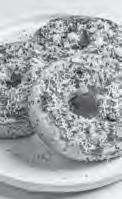

Glat Kosher Home Lots of Judaica for sale. Priced to sell. Kosher for Passover Dishes Plus tons of great stuff priced to sell
Saturday 7/20 9AM-2PM Sunday 7/21 9AM-2PM (50% off everything unless makes firm)
5456 Forbes Ave. 15217 Leave It 2 Laura • 201-341-8176
Please see the full advertisement in pghestatesales.com for photos and more information!
BUYING:
Grandma’s VERY Old Vintage/ Designer Clothing, Costume Jewelry, Hats, Box Purses, Cocktail-Evening Wear, Hawaiian, Prom & Prairie Dresses, Velvets, Bellbottoms, Jumpsuits, Platform Shoes, Go-Go Boots, etc
$ Cash Paid - Will Pick Up! $ Toll Free 888-736-7242

KleZlectic, Pittsburgh's premiere klezmer band, available for parties, events and concerts. Klezmer, jazz, popular and classical music. To listen and find out more, go to janicecoppola.com or contact Janice at janicecoppolatimes10@gmail.com or call (412)735-5973

THE BEST OF THE IN YOUR EMAIL INBOX ONCE A WEEK.
ttention Jews. Are you conflicted about the war against Hamas? On the one hand, for years and years, Hamas was shooting rockets at Israel from Gaza. Israel set up bomb shelters all over the place, instituted a rapid alert system so residents could flee to those shelters in minutes or even seconds, and had air defense systems that mitigated the airborne attacks. Israelis — and we who care about Jews not being murdered — settled into a quiet acceptance. The status quo allowed us to not panic. Life was always hard for Gazans, and we always felt for them but that was the doing of Hamas. Hamas, we knew then and certainly know now, was taking all sorts of aid and building materials — that could have made Gazan life better — to make tunnels and rockets and do pretty much anything other than helping the Gazans. It was awful. It’s even worse now.
Og went out to battle other than that he did. And he lost. We didn’t start the fight; we didn’t want the fight.
Now we begin our portion: “Moab was alarmed because that people was so numerous. Moab dreaded the Israelites and Moab said to the elders of Midian, ‘Now this horde will lick clean all that is about us as an ox licks up the grass of the field.’” But would they? Perhaps we are seeing a very early version of “fear of Jews”? Perhaps this is an early example of panic over too many Jews succeeding too well leading people to manufacture false libels against us.
There is an underlying theme in our foundational history that positions us as wanting to be quietly amongst ourselves to fulfill our brit. We are willing to fight if required but prefer not to. I am mindful of other moments, particularly the Book of Joshua, where ancient Israelite behavior does not conform to our more peaceful inclinations, but that does not deny that there is a constant yearning to be left alone and a constant need to fight when set
We’re supposed to use our heritage to make the world a better place and make ourselves better people.
On the other hand, a lot of us Jews are just sick and tired of Jews being murdered. We are tired of threats to wipe us out, fed up with taking us captive, horrified by and not forgetting the barbaric sexual violence used as an intentional weapon. We’ve had enough of being targeted. Hamas broke a de facto cease-fire; they poked the bear too much and now they are suffering the retaliation. And a lot of us are feeling OK about that. Except our hearts break for the Gazans who are caught up, bombed out, displaced, hungry. How can we not feel anguish for the suffering of the civilians?

• Environmentally safe chemicals used • We use the same cleaning solution that the National Park Service uses
• Serving most cemeteries around Pittsburgh Headstone Cleaning For more information, please email Dan at pghdano@aol.com WANTED

Sign up on the right hand side of our homepage.
pittsburghjewishchronicle.org
OF THE IN YOUR EMAIL INBOX ONCE A WEEK. Sign up on the right hand side of our homepage.
Sign up on the right hand side of our homepage. pittsburghjewishchronicle.org
A WEEK. Sign up on the right hand side of our homepage. pittsburghjewishchronicle.org
pittsburghjewishchronicle.org
See? Conflicted.
Well, those feelings are pretty normal for us Jews. They go way back, all the way back. In Parashat Balak, we start with Balak recalling what the Israelites did to the Amorites. What did they do? The Israelites, while on the march, asked for safe passage through the territory of Sihon, king of the Amorites. They promised to not even drink water from their wells. “No,” Sihon, said and he attacked the Israelites. The Israelites fought back and won. And this happened again when they came to Bashan. The text offers no reason why King
upon. We don’t like it but what can we do? Up and die? We’re supposed to use our heritage to make the world a better place and make ourselves better people. I understand the irony of the tremendous sadness wartime destruction brings both in antiquity and now. The current destruction is the result of us wanting to stay alive in order to make the world a better place. But should we just simply say to the ancient Egyptians, Canaanites, Persians, Greeks, Romans and so forth, up until this day, “Our existence is causing you grief. Come murder us all to make the world a better place?”
Reasonable people can say to Hamas enough is enough, and reasonable people can also have questions about the prosecution of the war in Gaza. Reasonable people are allowed to feel conflicted about that. Sometimes things don’t go smoothly and we can feel bad. But we get to stay alive and live out our heritage. About that, I’m not conflicted. PJC
Rabbi Larry Freedman is the director of the Joint Jewish Education Program. This column is a service of the Greater Pittsburgh Jewish Clergy Association.

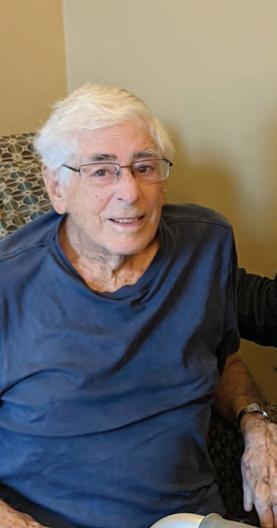
AVERBACH: S. Lewis Averbach, age 94. Lew passed away peacefully on Sunday July 14, 2024. He was the beloved husband of the late Marlene Averbach for 53 years. He was the caring father of Milo (Frani), Betty Ann and Steven (Mark Dickenson) verbach; proud grandfather and great-grandfather. Lew was preceded in death by his parents, Abraham Averbach and Celia Bilder Averbach, and his sister Betty Ann Averbach. He is also survived y his special friend Helen Caplan. Lew was kind, humorous, sweet and a true gentleman. We miss him already. Services and interment at Torath Chaim Cemetery. In Lew’s memory please consider a donation to the Marlene and Lewis Averbach Memorial Endowment Fund at the Jewish Federation of Greater Pittsburgh, 2000 Technology Drive, Pittsburgh, PA 15219, or a charity of your choice. schugar.com
Lucien Bromberger, 88, passed away on Friday, July 12, 2024, surrounded by his loving family. Lucien was born in Antwerp, Belgium, on March 15, 1936. He came to the United States with his two older brothers and their parents in 1940 to escape the Nazi regime. They settled in Manhattan. He was the last surviving member of the family. Lucien oved to Pittsburgh where he started a business selling recreation equipment to commercial institutions. He was an avid collector of stamps and coins and loved exploring his surroundings as well as the natural environment. Lucien’s curiosity and interests extended to those he met here and in his travels. Lucien is survived by Joyce, his wife of 58 years, and two sons, Jeffrey (Lesli Harris) and Matthew, whom he dearly loved. He is also survived by his sister-in-law Leslie Lenox and his brother-in-law Gary Lenox (Eileen Conlon), three nephews, a niece, and great-nieces and -nephew. He will be greatly missed but will be in our hearts forever. Donations in memory of Lucien can be made on-line to Anathan Adult Day Services at JAApgh.networkforgood.com Graveside service and interment were held at Homewood Cemetery. Arrangements entrusted to Ralph Schugar Chapel, Inc. schugar.com
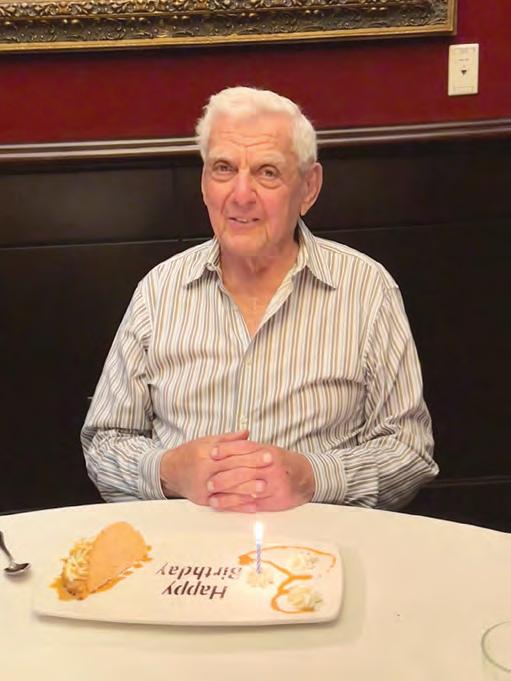
Donald L. Farkas. Beloved husband of the late Shirley M. Farkas. Loving father of Gail (late Jamie) Bayer, Sharon Green and the late Gary Farkas. Devoted grandfather of Jared, Alexis, Brooke and Blake. Also survived by many nieces and nephews. Don grew up in McKeesport and was a hard worker, working seven days a week to become a self-made man. He had a great sense of humor and loved his wife and family. He loved going to Costco and his and his wife’s annual trips to Florida every winter. Don loved going out to dinner and was an avid card player. Services were held at Ralph Schugar Chapel, Inc. Interment Beth Shalom Cemetery. Contributions in Don’s memory may be made to Congregation Beth Shalom, 5915 Beacon St., Pittsburgh, PA 15217, or to the Pennsylvania
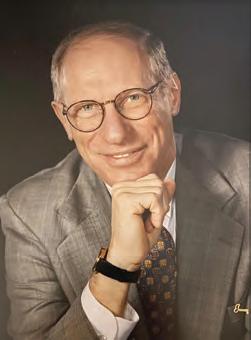
Thomas Hollander, 88, passed away peacefully on July 10, 2024. Thomas was born in Monessen, Pennsylvania, on March 9, 1936, the first son of Edith and Edward Hollander. Handsome with sharp hazel eyes, he was drawn to music of all kinds and studied piano, French horn, recorder and sang in the choir. He loved academics and was a champion debater. These two great loves — music and argument — would be the through line of his extraordinary life and give him purpose professionally and comfort spiritually. After graduating from Monessen High school in 1954, Thomas enrolled at Penn State where he was a member of the debate team and president of the student body. It was there that he met Barbara Ann Stone. After graduating from Penn State, he entered the University of Pittsburgh Law School where he coached their debate team, studied law and married Barbara in 1960. After passing the Pennsylvania state bar, Tom joined Evans, Ivory law firm (which in time became Evans, Ivory, Moses, Hollander and McVay), where he specialized in representing railroad and barge workers. Thomas was a talented and sought-after attorney. He argued before the Supreme Court, was president of the Allegheny County Bar Association in the late 1980s where, during his term, he was instrumental in establishing efforts and committees to address discrimination against women lawyers and lawyers of color. In addition to receiving awards and recognition as one of Pittsburgh’s best lawyers, he received the highest award from the Allegheny County Academy of Trial Lawyers — the Hon. Joseph Weis Distinguished Service Award. Tom is survived by his three children with Barbara, Scott (Teo) of Pittsburgh, Leslie of Great Falls, Virginia, and David (Courtney) of Los Angeles, and his six grandchildren — Ben, Nathaniel, Clay, Delilah, Harper and Roan. He cherished his late brother, Burton Hollander (Gail). Tom is also survived by his loving nieces Julie Eichelbaum (Dennis), Marla Farbacher (Dana) and Andrea Mallinger (Adam). Tom adored spending time at Deep Creek Lake with family and friends. He loved his alma mater and became the president of the Penn State Alumni Association, one of the largest alumni bases in the United States. He was also a champion of the arts, the Constitution, social justice, civil rights and deeply influenced by his wife Barbara’s devotion to women’s rights. He volunteered for the ACLU and tried many cases for the organization and served on the board as president. He was also the president of the many boards that cut across the legal, political and cultural spectrum of his beloved city of Pittsburgh; Neighborhood Legal Services, The Jewish Chronicle, the Jewish Healthcare Foundation and the City Theatre, to name a few. Tom loved travel and the outdoors. He was an avid runner, skier, motorcyclist, sailor and tennis player. He also kept up his love for music throughout his life. He sang in the Mendelsohn Choir of Pittsburgh for decades, practiced piano daily and rarely missed a performance of the Pittsburgh Symphony. He was a beloved friend, and a fierce advocate for the disenfranchised and wrongfully hurt, injured or discriminated against. He was decent, often kind, and careful with his words and actions. He was fair. He took pleasure
in small things. He lived life on his own terms and was loved very much by his family who are so grateful to have had such a powerful role model. All are welcome to attend a Sept. 21 or 22 celebration of life with details to be finalized. In lieu of flowers, donations in his memory can be made to the Barbara S. Hollander Women’s Leadership Fund at Chatham University online at Donation · Chatham University · GiveCampus, and making a memorial gift in memory of Thomas Hollander.
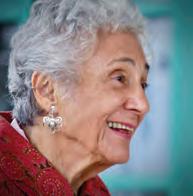
KENNEDY: Doris Kennedy passed away peacefully at 97 years old in Pittsburgh on Monday, July 8, 2024, surrounded by family. She is the mother of George Arnold (Laura), Alan Arnold (Adele), Nancy Arnold and Kate Kolbrener (Michael); the grandmother of Jon Arnold, Sarah Arnold, Eric Arnold, Julie Pike, Matthew Kolbrener and Will Kolbrener; and great-grandmother of Evan, McKenna, Alia, Judah, Micah, Noah and Jacob. Born on Sept. 5, 1926, Doris always had a zest for life, inspiring those around her with her positivity and by seeking joy even in the small and quiet moments. She was a graduate of Taylor Allderdice High School and Ohio State University, where she studied occupational therapy. While raising children with her first husband, Robert J. Arnold, she was employed by the occupational therapy department at West Penn Hospital and worked in the field for most of her career until she retired at 72 years old. Doris spent her middle age years married to Dr. David Kennedy, with whom she traveled often to Israel, learned Hebrew, began painting and wrote poetry. For more than eight years near the end of her life she happily resided at Weinberg Terrace in Squirrel Hill. She loved walking through the neighborhood to meet friends and family for meals and set about pursuing her many interests, including attending art classes at the JCC.
While at Weinberg Terrace, she served on the food committee, attended Friday Shabbat services and continued writing poetry. In 2018 Doris self-published a book of poems called “Variations,” and on Feb. 5, 2019, she hosted a book signing. This cherished poem below, called “Helpful SelfTalk,” is from her collection and its sentiment is one we’ll continue to carry within each of us:
Helpful Self-Talk
Who speaks to you in a kindly word your “good mother”
Is the one you’ve heard you carry her along
So she’s waiting to say only wonderful things about you today
No matter your age it’s wise to know
A mother can be with you wherever you go So listen to your voice saying her words With positive messages That need to be heard Giving you confidence Building your pride For that wonderful feeling inside –Doris Kennedy
Graveside service and interment were held at Homewood Cemetery. In lieu of flowers, contributions may be made in honor of Doris Kennedy to the Jewish Association on Aging, Weinberg Terrace, 5741 Bartlett St., Pittsburgh, PA 15217. Arrangements entrusted to Ralph Schugar Chapel, Inc. schugar.com
LESGOLD: Elaine Lesgold (née Blevins), age 41, passed away unexpectedly following a brief illness on Wednesday, July 10, 2024. She is survived by her beloved husband, Noah Lesgold; parents, Jeanne Karison and David Blevins; parents-in-law, Alan and Sharon Lesgold; sister Martha Thomas (Matt), and nieces Karison and Marybeth; brother-in-law Jacob Lesgold















Obituaries:
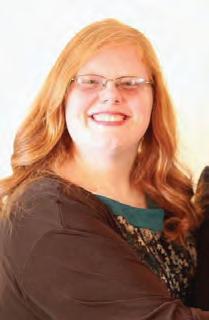
Continued from page 19
(Kristina Rice); and many members of extended family. Elaine was born Dec. 20, 1982, in Crawfordsville, Indiana, and raised in Montgomery, Alabama and Buckhannon, West Virginia, before finding Pittsburgh as her home. She attended Westminster College and received a B.A. in psychology from Carlow University. Elaine worked as a peer coun selor and tutor in statistics and neuroscience, and enjoyed helping students succeed and graduate even if they initially believed they would fail. After a disabling injury, Elaine became a stronger advocate for inclusion and accessibility. She brought confidence to people facing challenges and joy to all who knew her. Services were held at Rodef Shalom Congregation. Interment Temple Sinai Memorial Park. In lieu of flowers, contributions may made to the Disability Inclusion Fund of Temple Sinai (Attn. Drew Barkley); 5505 Forbes Avenue, Pittsburgh, PA 15217. Arrangements entrusted to Ralph Schugar Chapel, Inc. schugar.com

D’Alessandro Funeral Home and Crematory Ltd.
“Always A Higher Standard”
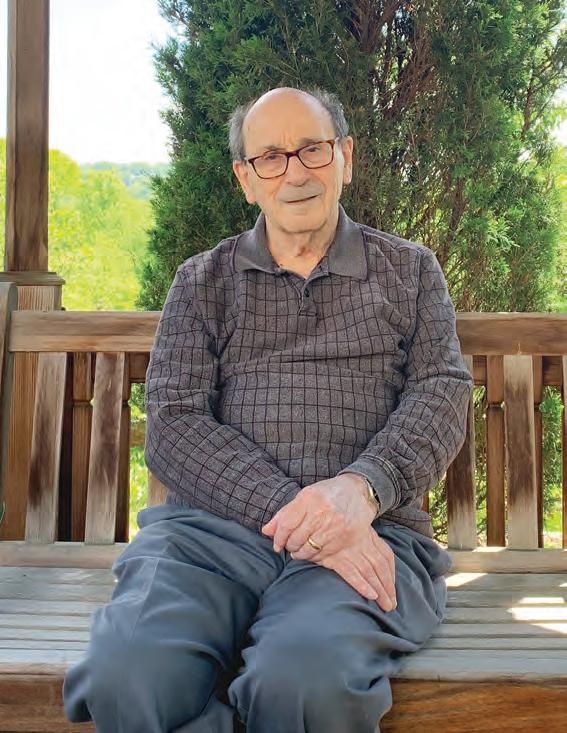
Alan Levinson, age 94, passed away from natural causes on Thursday, July 11, 2024. Beloved husband of 67 years to Phyllis Snyder Levinson. Loving father of Todd Levinson of Los Angeles, California, and Amy Levinson Gilligan (Gerald) of Pittsburgh. Cherished son of the late Charles and Joann Levinson and brother of David Levinson and family of Florida. Devoted grandfather of Joanne and Maggie. Alan was a graduate of Taylor Allderdice High School and University of Pittsburgh. He and Phyllis moved to San Diego and had their son Todd, then moved to New Jersey for 60 years and had their daughter Amy. Alan worked for Boeing for 50 years and was the engineer of record for Chinook helicopters. He was an active member of Temple Adath Emanuel of Mount Laurel, New Jersey. Alan moved to Pittsburgh in 2021 and lived with his wife, Phyllis, in Longwood at Oakmont, beating the other residents at bridge and pickleball. Services were held at Ralph Schugar Chapel, Inc. Interment B’nai Israel Cemetery. Contributions may be made to Greater Pittsburgh Community Food Bank (give.pittssupport.savethechildren.org). schugar.com
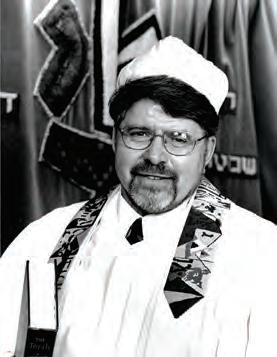

Dustin A. D’Alessandro, Supervisor • Daniel T. D’Alessandro, Funeral Director 4522 Butler St. • Pittsburgh, PA 15201 (412) 682-6500 • www.dalessandroltd.com
The Jewish Cemetery & Burial Association of Greater Pittsburgh (JCBA) welcomes inquiries about the purchase of burial plots in JCBA cemeteries.
JCBA is committed to the proper care and maintenance of sacred grounds, and is devoted to the stewardship of Jewish cemeteries in Western Pennsylvania.
Plots are available in the following JCBA cemeteries:
Agudath Achim – Beaver Falls
Agudath Achim – Hampton
Anshe Lubovitz
Beth Abraham
B’nai Israel- Steubenville
Holy Society – Uniontown
Johnstown Jewish Cemeteries
Kether Torah
Machsikei Hadas
New Castle Jewish Cemeteries
Poale Zedeck Memorial Park
Rodef Shalom
Shaare Torah
Tiphereth Israel - Shaler
Torath Chaim
Workmen’s Circle #45
We anticipate plot and burial fees at all JCBA cemeteries to increase in 2025.
For more information please visit our website at www.jcbapgh.org, email us a or call the JCBA at 412-553-6469.


Rabbi Fredric Stanley Pomerantz, beloved husband, father, saba, brother, uncle, spiritual leader, teacher and community pillar passed away on Monday, July 8, 2024, at the age of 84. Fred was born on Nov. 29, 1939, in Pittsburgh, to the late Harold and Marcia (Levy) Pomerantz. He was preceded in death by his son Jeremy Daniel and brother Richard. Fred’s family circle includes his wife, Sandra; children, Joshua and Marta Pomerantz and Rabbi Rebecca and Lawrence Shinder; grandchildren, Jeremy Todd, Jacob and Hannah; siblings, Deborah and Kenneth Cook, and Sylvan and Honni Pomerantz; as well as a multitude of beloved nieces, nephews, cousins and friends. His family moved to a farm in Greensburg before settling in Jeannette, Pennsylvania, becoming a bar mitzvah (1952) at Congregation Chevra Shalom. He traveled north to start his undergraduate studies at Penn State (playing drums in the iconic Blue Band) before transferring to the University of Pittsburgh where he graduated in 1962, and met his dedicated wife, Sandra. The following years were spent in Cincinnati, Ohio, receiving his rabbinical ordination from Hebrew Union College in 1968 after a yearlong position as rabbi at a liberal congregation in Wembley, England. Throughout his esteemed career, Rabbi Pomerantz served the congregants of Rodef Shalom in Pittsburgh (1968-1973), Temple Beth El in Northern Valley, New Jersey (1973-2004), and Congregation Agudas Achim in Sullivan County, New York, from 2004 until his death. Over the years, he touched countless
Please see Obituaries, page 21
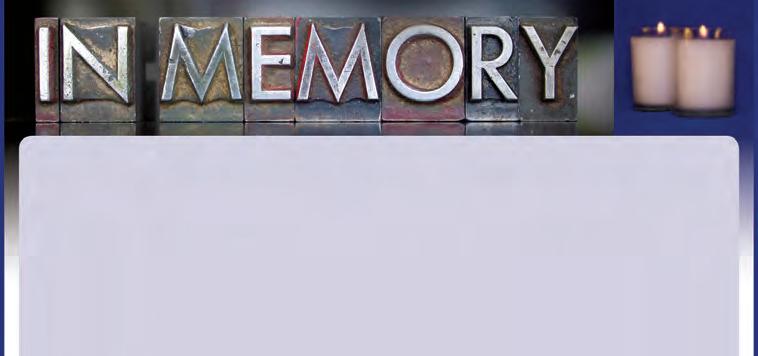
Sherry Cartiff
Edward M Goldston
Irwin Goldston
Dorothy Goldston
Dorothy Goldston
Yetta Joshowitz .Isadore Joshowitz
Howard & Shelley Miller .Larry I Miller
Ted Pinsker .Lawrence Rudick
Nathaniel S Pirchesky
Jeffrey & Linda Reisner and Family
Richard, Mindy, & Logan Stadler
Karen K Shapiro
Eileen E Snider & Family
Sharon Snider
Dr Susan Snider & Family
Leslie & Richard Snow
Elizabeth P Sklov
Lawrence Brodell
P Rosen
Kuperstock
E Snider
E Snider
E Snider
Snow
Yetta Speiser Z”L .Harriet Lee Siskind
Mitchell Toig .Zetta Levy
Contact the Development department at 412-586-2690 or development@jaapgh.org for more information. THIS WEEK’S YAHRZEITS —
Sunday July 21: Anna Barnett, Dorothy F Caninzun, Sam Choder, Howard Roy Erenstein, Leo Finegold, Barnet Goldstein, Joseph Greenberger, Ruth Kuperstock, Hyman Martin, Bernard J Miller, Cecile Oring, Simon A Oskie, Sidney Posner, Daniel Pretter, David Serrins, Mildred E Snider, Irwin M Solow, Joseph Weinberger
Monday July 22: Harry Finesod, Fannie Griglak, Freda Leff, Milton G Lehman, Pvt Ruben Lipkind, Rose Marcovsky, Marcus Benjamin Nadler, Harriet Lee Siskind, Meyer Spiro
Tuesday July 23: Leonard Bernstein, Minnie Bonder, Meyer Charapp, Rose Levy Ginsburg, Genevieve Harriet Israel, Ethel Kwall, Helen N Lehman, Bessie Breman Osgood, Myer W Singer, Anna Sarah Stern, Samuel Trachtenberg
Wednesday July 24: Pearl I Berdyck, Hinde Leah Davidson, J Philip Esman, Adolph Hepps, Samuel Hilsenrath, Zetta Levy, Dora Marcus, Lawrence I Miller, Fanny Novak, Irving Rosenberg, Bessie Finkelstein Simon, Sidney Stern, Irene Taylor, Herbert Walker
Thursday July 25: Leon Becker, Eli Bonder, Rose Esther Bonn, Albert Davis, Harry (Hershel) Fisher, Alice Foreman, Oscar Grumet, Samuel Halle, Samuel Hoffman, Leonard Joel Kirsch, Anna Kirshenbaum, John Kramer, Dora Levin, Dora Lipkind, Benjamin Riesberg, Sandra Platt Rosen, Lottie Stein Rosenthal, Nettie Rothstein, Mildred Stern, Burton Hill Talenfeld, Dorothy Zelda Wein
Friday July 26: Fanny Finesod, Maurice A Glasser, Beatrice Miller Kadas, Ellis A Kopelman, Maurice H Levine, Charlotte Levy Klevan, Lazar Litmans, Regina Ruth Keizler Mandell, Leah Rachel Miller, Ralph Moritz, Mollie Plotkin, Dolores Sheffler, Frank E Simon, Florence Stein, Sigmund Stern, Dr Lee Weiss
Saturday July 27: Sophie Weiss Arnold, Herman Berzosky, Stanley Bernard Blatt, Rose Bloom, Ida Cartiff, Lena Garfinkel Cohen, Rebecca Darling, Louis L Friedman, M .D , Dorothy Goldston, Anna C Martin, John Mermelstein, Ida D Roth, Ethel Sachnoff, Zelda Shapiro, Morris Silverman, Elizabeth Pirchesky Sklov, Benjamin S Smith, Martin W Snow, Goldie Solomon, Bella Spolan, Rose Coffee Stein
Obituaries:
Continued from page 20
lives with his inspiring sermons, compassionate counsel, friendship and music. Fred’s incredible creativity inspired the creation of his radical experimental jazz service, “Sim Shalom.” The service was a unique integration of Jewish music and meditation that utilized folk, rock and jazz to reconnect Jews to the ancient liturgy. Fred traveled with singers and instrumentalists to Reform synagogues in all parts of the country, allowing both young and older congregants to embrace and celebrate the Sabbath with new a heart and spirit. Rabbi Pomerantz’s “Electric Sermon” projected contemporary pop culture images coupled with midrash to make traditional worship more accessible, combining the timeless with the timely, the ancient with the present. Recognized for his innovative contribution to the American Jewish experience, the Central Conference of American Rabbis invited Pomerantz to join the Liturgy Committee, tasked with rewriting the “Union Prayer Book” from 1895. The new books “Gates of Prayer,” “Gates of Repentance” and “Gates of the House,” published in 1975, have been used by millions of Reform Jews for the last 40-plus years. In addition to his rabbinical work, Fred was an artist at heart. His passion for music, fine arts and theatre were intertwined with all aspects of his life. He also loved history, but most of all, he loved people. He could name any tune, answer any “Jeopardy” question, and could recite any historic military battle plan without asking Google. He was a talented jazz drummer who turned anything and everything into a drum, including pots/pans, his desk, and the dashboard of his car. He lived a fascinating life surrounded by so many loved ones, and his legacy will remain in all of our hearts. A funeral service was held on July 10, 2024, and may be viewed at the following link: avodat-shalom.livecontrol.tv/e2419742 Donations in Rabbi Pomerantz’s memory may be made to Temple Beth Shalom, “Pomerantz Memorial Garden,” at the following link: tbsny.org
WANDER: Irene E. Wander, age 98, of Boca Raton, Florida, formerly of White Oak, Pennsylvania, died peacefully on Saturday, July 6, 2024. She was born in Pittsburgh on Dec. 2, 1925, and was the daughter of the late Simon and Rachel Finkelstein Rudick. For 72 years, Irene
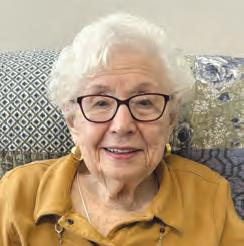
was married to the late Harvey Wander. Soon after their marriage, they moved to McKeesport where they raised their two children. Irene is survived by her children, Elyse Wander (Judy Retchin) of Boca Raton; Jeffrey J. Wander (Lisa Pfund) of Cuyutlán, Mexico; grandchildren, Joshua Wander (Amy); Meghan Wander; Layne Bruce; and reat-grandchildren, Zoë, Elliott, Calina, Shawn, Scarlett and Brooks. In addition to her parents and husband, Irene was preceded in death by her siblings, Eli Rudick and Minnie Adler. Her strong connection to Judaism gave Irene deep strength. She served as president of the McKeesport chapters of B’nai B’rith Women and Hadassah; president of her Temple’s sisterhood; and president of Temple B’nai Israel. After raising her family, Irene embarked on a 30-year career with the PA State Lottery. She retired as manager of the entire Pittsburgh Region. No one can dispute Irene’s culinary skill. She was a magician in the kitchen. She also was courageous, smart, feisty, caring and tenacious. Graveside services were held at Temple B’nai Israel Cemetery. Officiating was Rabbi Howie Stein. Arrangements by Strifflers of White Oak Cremation and Mortuary Services, Inc., 1100 Lincoln Way, White Oak, PA 15131 (Sue Striffler Galaski, supervisor, 412-678-6177). To share a memory or condolence, please visit strifflerfuneralhomes.com.
WEISS: Jay Allen Weiss, age 67, of Pittsburgh, died on Friday, July 12, 2024. He was born in Pittsburgh on May 13, 1957, and is the son of Sally Ann Bailey Weiss of Pittsburgh and the late Seymour Weiss. Jay was a member of the U.S. Army National Guard, and was employed as a police officer for over 20 years in Cleveland, Ohio. In addition to his mother, Jay is survived by his son, Raphael (Rachel) Glickman of Cleveland, Ohio; grandchildren, Shira, Molly, Akiva and Goldie; siblings, Sandee Lynn Bloom of Monroeville, Pennsylvania; Tammy (the late John) Rattacasa of Glassboro, New Jersey; Stephen (Jill) Weiss of Reading, Pennsylvania; and many nieces and nephews. Graveside services were held at Gemilas Chesed Cemetery. Officiating was Rabbi Ari Spiegler. Arrangements cared for by Strifflers of White Oak Cremation and Mortuary Services, Inc., 1100 Lincoln Way, White Oak, PA 15131 (Sue Striffler Galaski, supervisor, 412-678-6177). To share a memory or condolence, please visit strifflerfuneralhomes.com. PJC
Holocaust survivor who offered grandmotherly sex advice as ‘Dr. Ruth,’ dies at 96
By Andrew Silow-Carroll, Curt Schleier
Rmillions of listeners as the taboo-breaking radio sex therapist “Dr. Ruth,” died on Friday at her home in Manhattan. She was 96.
Her program, “Sexually Speaking,’” which launched in 1980 on the now defunct WYNYFM, broke broadcasting taboos about talking about sex and helped make her the most famous sex therapist in the world — albeit one with a motherly demeanor and thick German accent.
She was a firm believer in sex as healthy dialogue among consenting partners, in which each indulged and appreciated the other’s needs and quirks. She also emphasized psychology over biology. “When it comes to sex, the most important six inches are the ones between the ears,” she once famously said.
In her book 1995 book “Heavenly Sex: Sexuality in the Jewish Tradition,” written with Jonathan Mark, she described sex as a mitzvah — or commandment — and also as positive act that Judaism did not consider shameful or base. In Jewish tradition, a healthy sex life is essential to “peace in the home,” she wrote, invoking a Hebrew phrase for domestic tranquility.
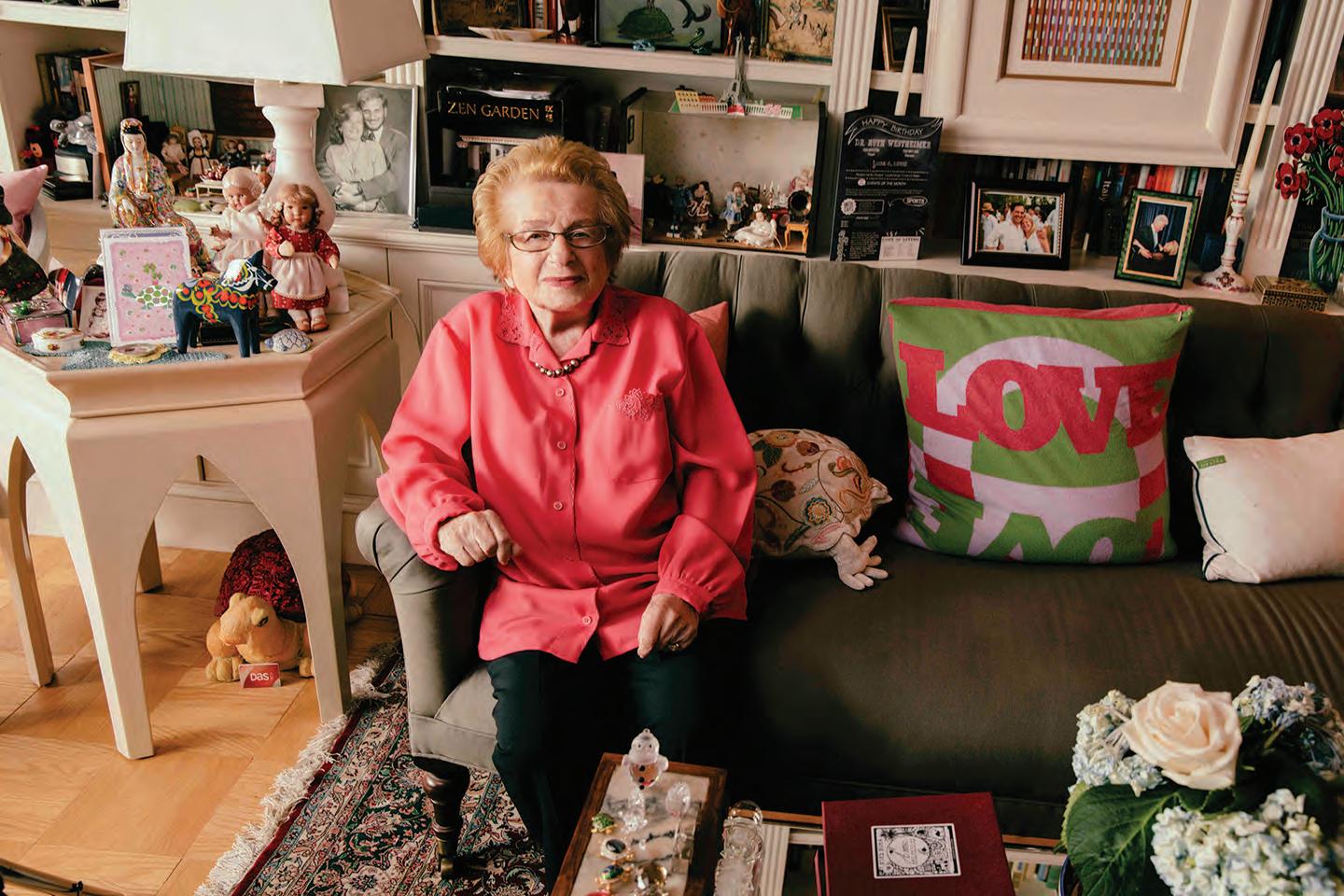
And yet, she acknowledged, there were limits — once telling an audience that the idea that a man should be able to last “for hours” during sex was a myth. “No woman that I know of wants that,” she said. “She has other things to do!”
Karola Ruth Siegel was born in Germany in 1928, the only daughter of Orthodox Jews. She was 10 years old the last time she saw her father — from her apartment window as he was arrested by Nazis. It was November 1938, the day after Kristallnacht, and his detention was
only one complaint: Girls couldn’t go to high school. They made all the girls get household helper diplomas, so I spent two years learning how to be a housemaid. Luckily for me I didn’t have to use it.”
At war’s end, she immigrated to then-Palestine, lived on a kibbutz and joined the Haganah, the precursor to the Israel Defense Forces. Westheimer trained as a scout — and also a sniper. She never shot anyone, but was severely wounded by an artillery shell during the War for Independence in 1948.
She moved to Paris with her first husband, to New York with her second. She has earned degrees in psychology (Sorbonne), a master’s
in a newspaper article as “the happy munchkin of sex” described what would have happened had her life taken a different turn during and after the Holocaust.
“If I would have stayed in Frankfurt in the Orthodox Jewish milieu, I don’t think I would have talked about orgasms and erections,” she said. “It’s very interesting. Because I was an orphan at a very early age, I was determined to speak up explicitly about things I believe in.”
Her life story is told in Mark St. Germain’s play “Becoming Dr. Ruth,” which has been performed regularly since he wrote a version in 2012. Among those who played her was Tovah Feldshuh, who starred in the off-Broadway
production in 2021 at the Museum of Jewish Heritage in Lower Manhattan.
“I’m just sitting there at the edge of my seat and I don’t miss a word watching her,” Westheimer told the New York Jewish Week about watching Feldshuh in the play. “It is fantastic to see her being Dr. Ruth K. Westheimer, to see her dance, to see her describing my love affairs, to see her describing my marriages.”
Westheimer belonged to two synagogues, one in the Washington Heights neighborhood of Manhattan where she lived, the other nearby in the Bronx. She also occasionally attended services at Central Synagogue and at the Park East Synagogue, both in Manhattan.
She was an active supporter of the Museum of Jewish Heritage, and the YM & YWHA of Washington Heights & Inwood. She was a fixture in Washington Heights and the Upper West Side, where she would often be seen sitting in the front row of Jewish events.
“The world feels a bit darker today with the loss of Ruth Westheimer,” Jack Kliger, CEO and president, and Bruce Ratner, chairman of the board, of the Museum of Jewish Heritage, said in a statement. As a board member since 2004, “she played an integral role in furthering our mission to educate, commemorate, and inspire future generations about the Holocaust and its lessons. Her commitment to preserving the memory of the Holocaust and ensuring that its history is never forgotten was unwavering.”
She is survived by her son, Joel Westheimer; her daughter, Miriam Westheimer; and four grandchildren.
She wrote close to 30 books, including “Roller Coaster Grandma,” a graphic novel-style autobiography for 8- to 12-year-olds that talks about her experiences during the Holocaust. In one section, she recalls taking two of her grandchildren to an amusement park, where they all rode on the roller coaster. Well, not all: Dr. Ruth was too short. PJC


Maxine Solomon Berkshire Hathaway Home Services
C: 412-427-1048 O: 412-521-5500 412-521-5500

Sherri Mayer, Realtor Squirrel Hill Office C: 412-760-0412 O: 412-421-9121x225 sherrimayer@howardhanna.com HowardHanna.com


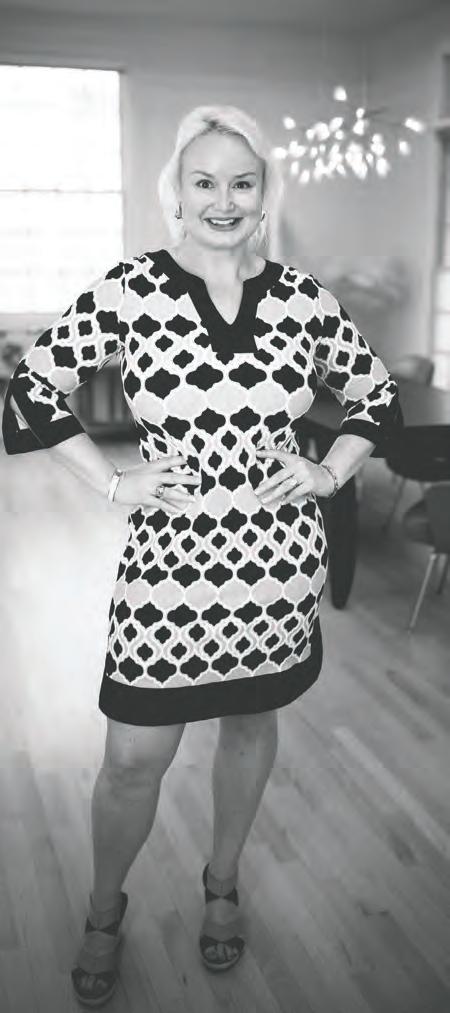

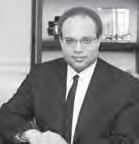


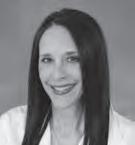


Team Jason A. Smith & Caryn Rosenthal Jason: 412-969-2930 | Caryn: 412-389-1695 Jasonasmith@howardhanna.com Carynrosenthal@howardhanna.com

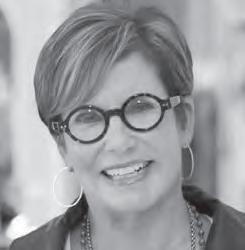












Bring them home
Community members gathered on the corner of Darlington Road and Murray Avenue in Squirrel Hill to demand the release of an estimated 120 hostages. The captives have remained in Gaza since Oct. 7.
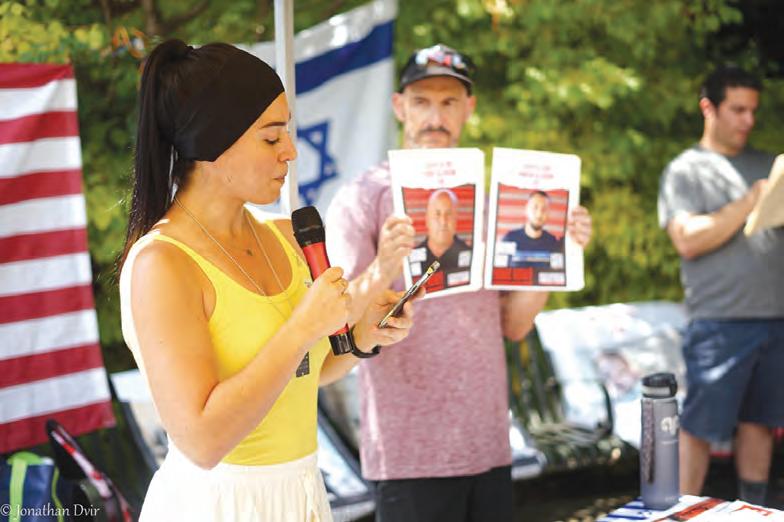
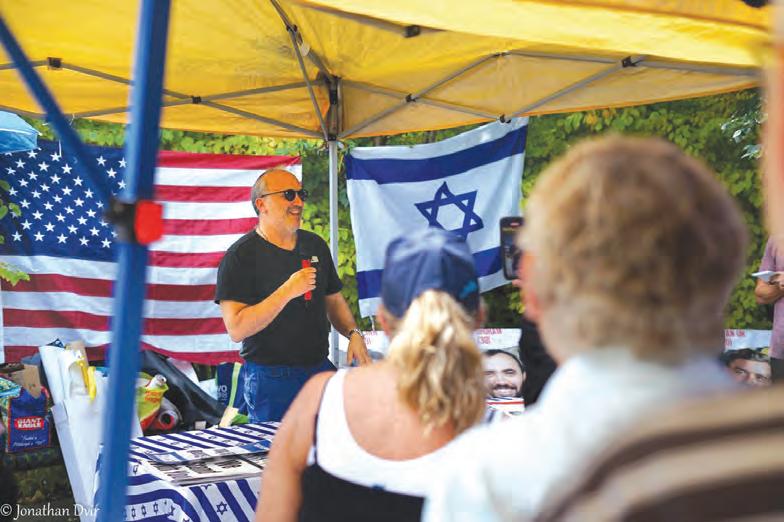
Rodef Shalom Congregation honored Eradicate Hate Global Summit founders Laura Ellsworth and Mark Nordenberg with the Pursuer of Peace award on June 23. The award recognizes the significant commitment and sustained contribution of an individual or organization to the pursuit of peace through fostering interfaith understanding, encouraging humanitarianism, and/or promoting a social justice agenda to bring healing to our fractured world.
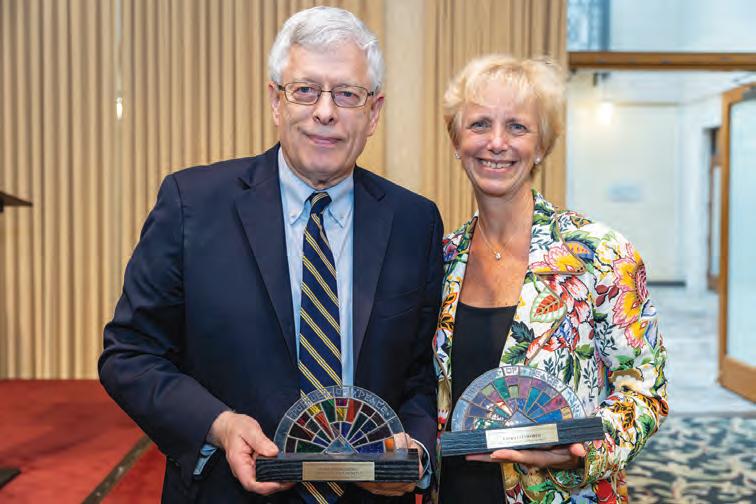
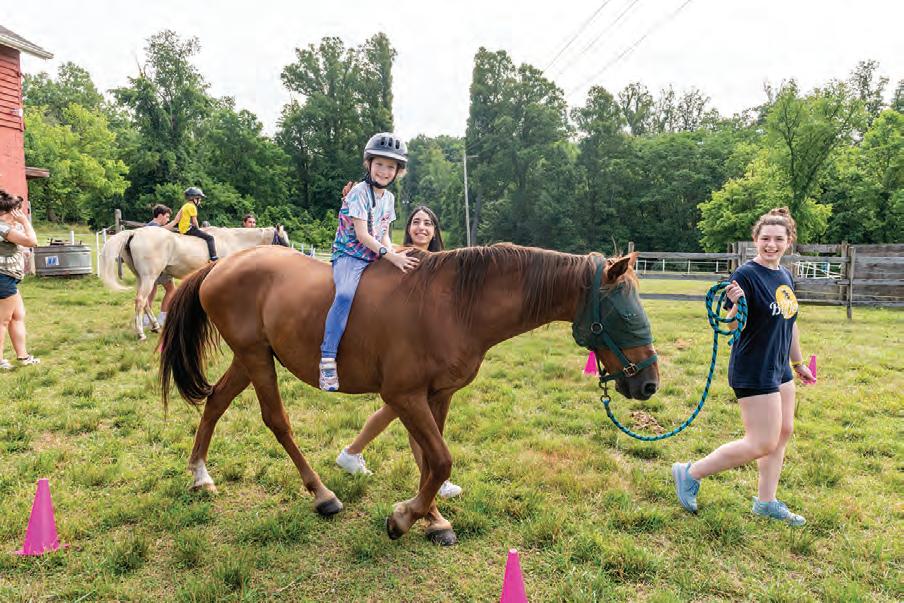
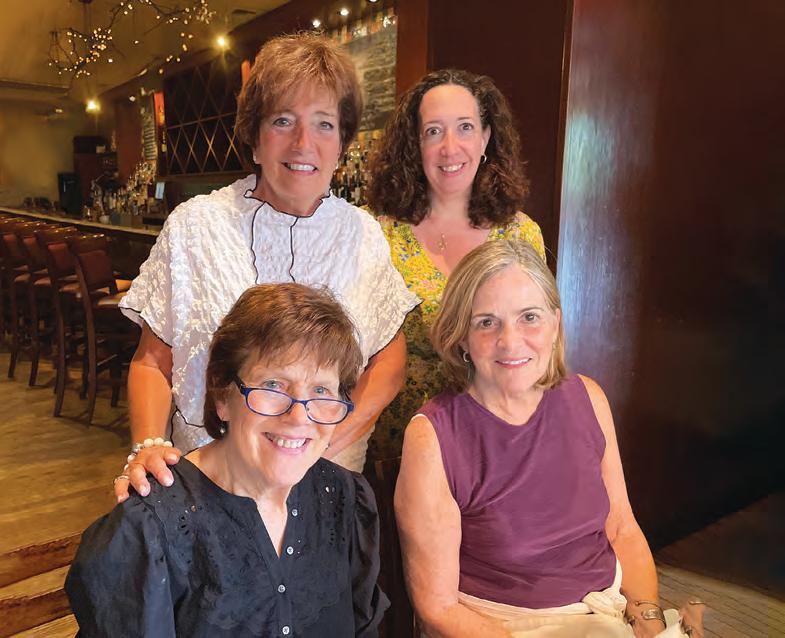
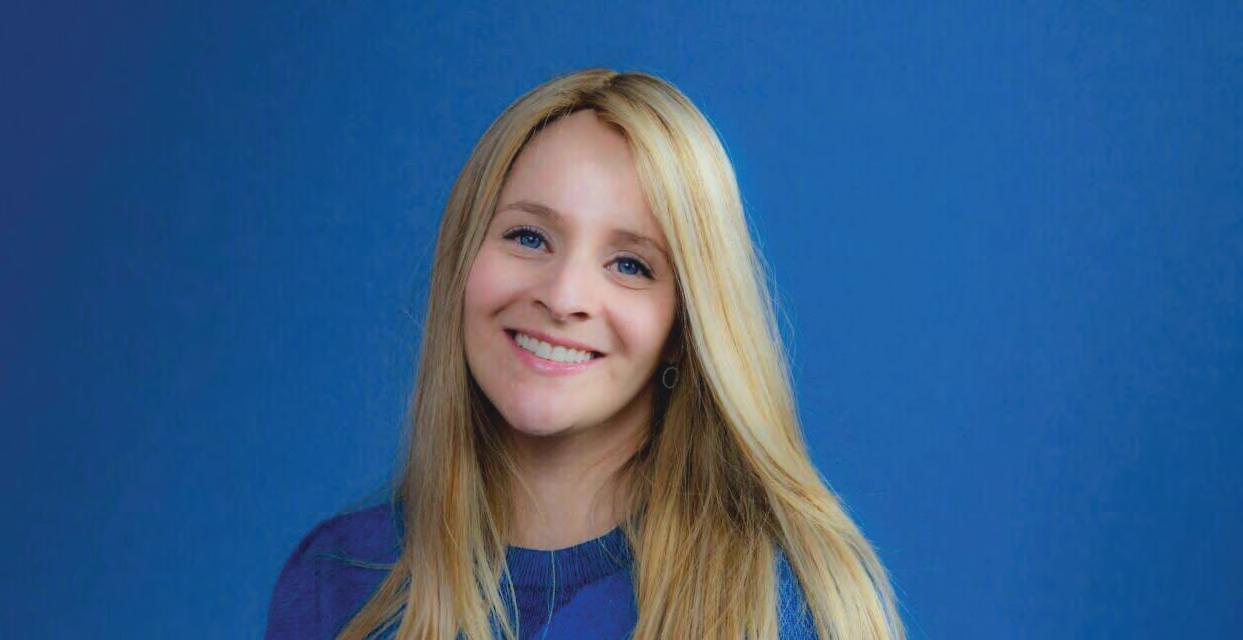

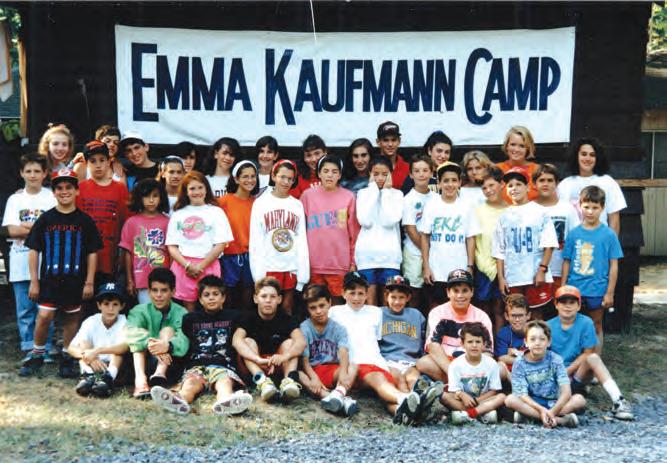

Did you a�end Emma Kaufmann Camp, Emma Farm, Laurel Y or Camp Lynnwood?
We’re bringing together past campers and staff members to connect, share memories and support the con�nued success of EKC!
Whether you spent one summer or many at EKC, your experiences and contribu�ons have helped shape our camp's rich history!
Join our growing community. Stay updated on upcoming events, reunions and EKC news HERE:
More info: Teddi Horvitz, EKC Alumni and Development Associate thorvitz@jccpgh.org